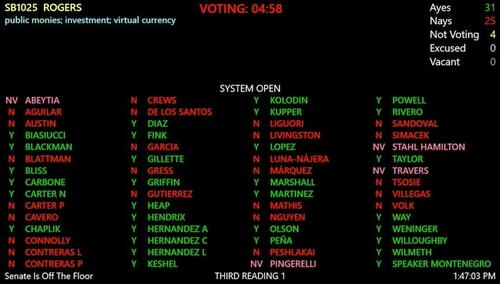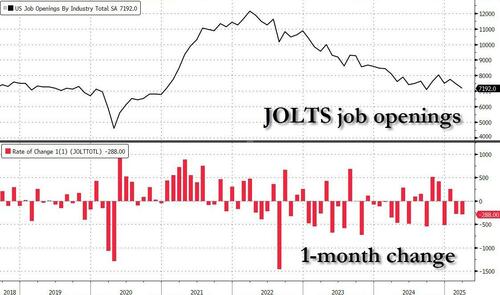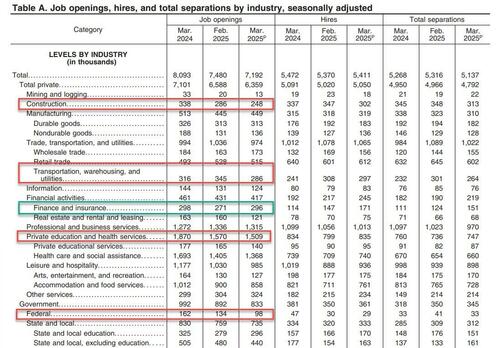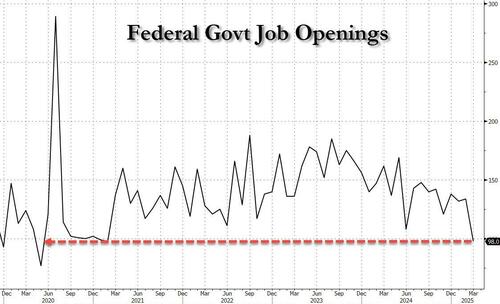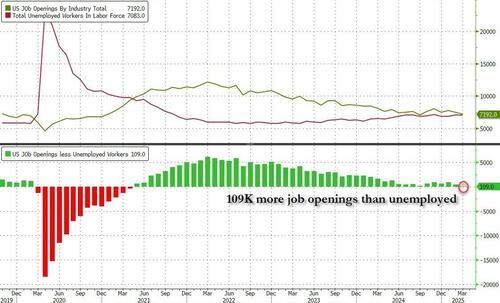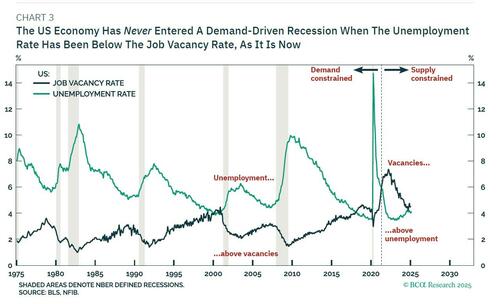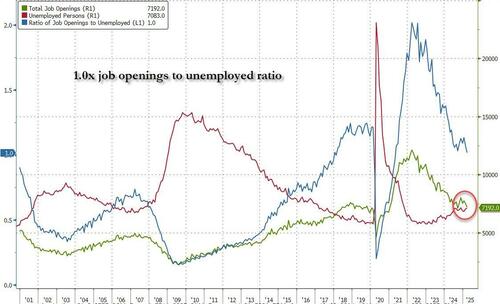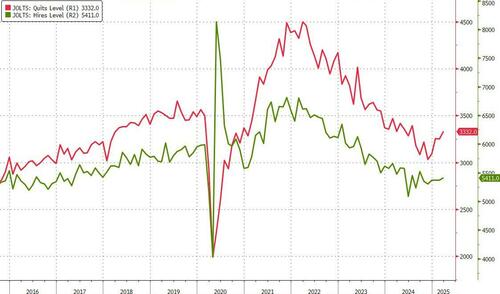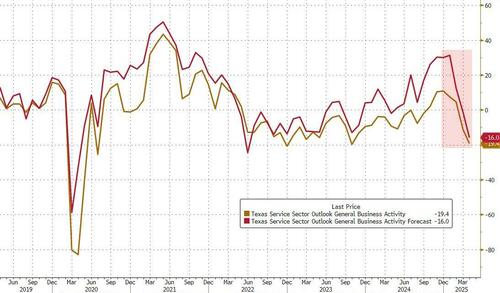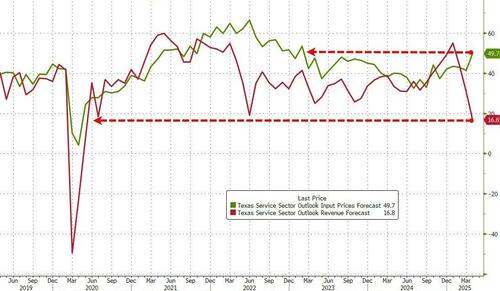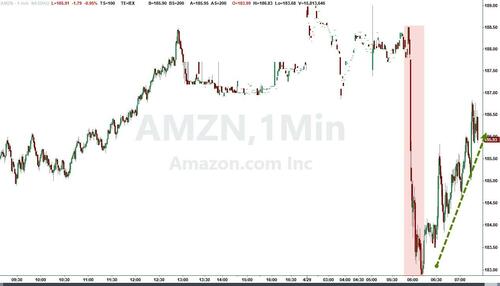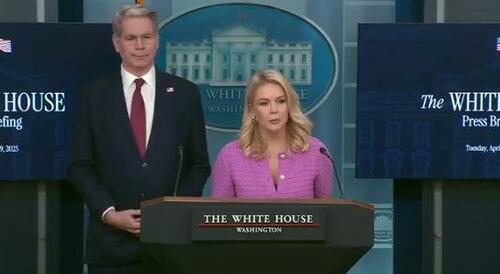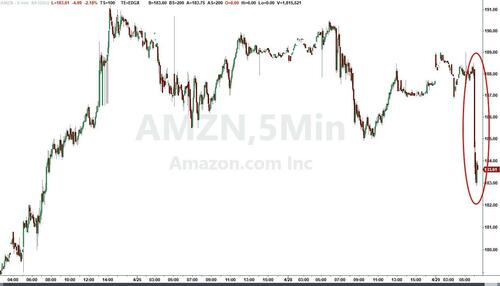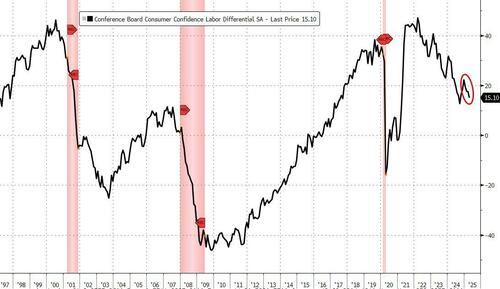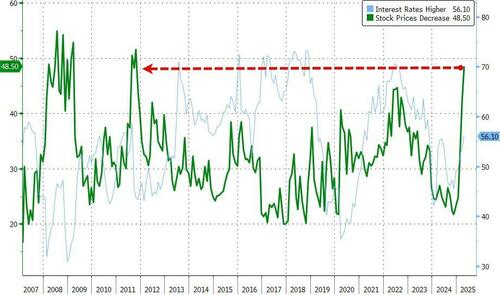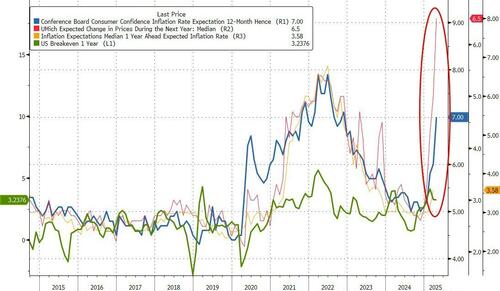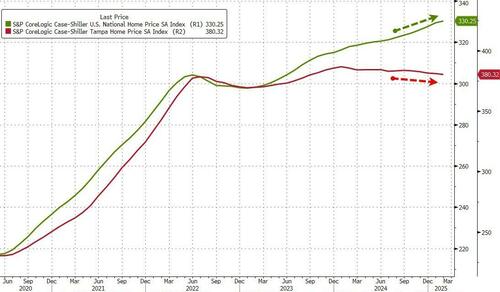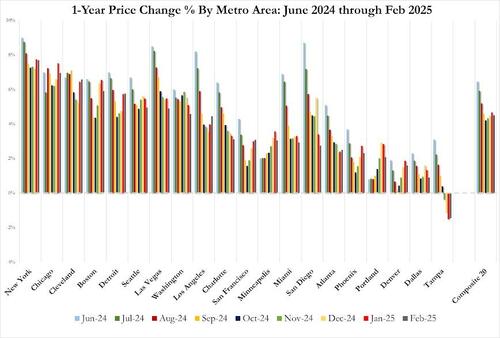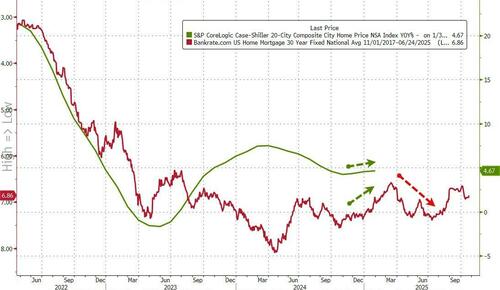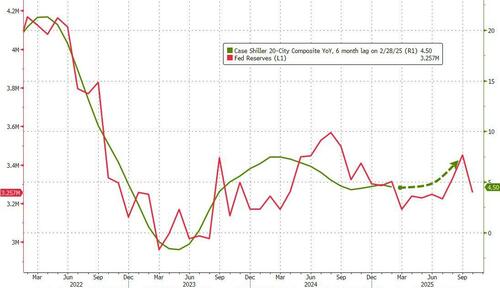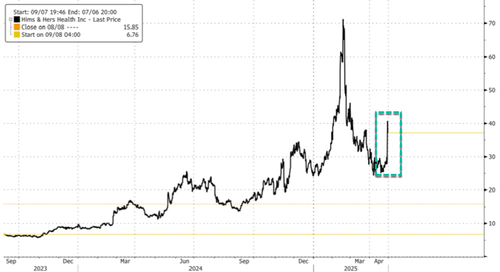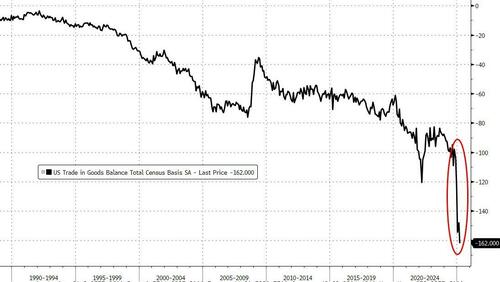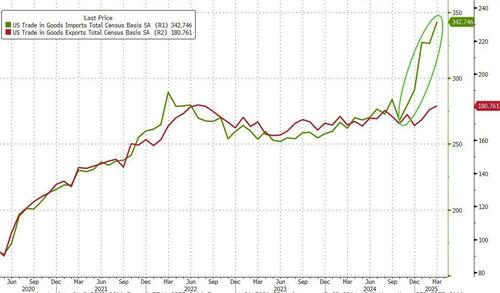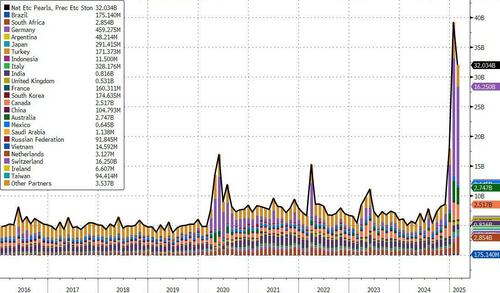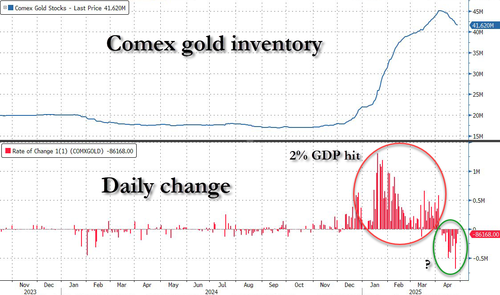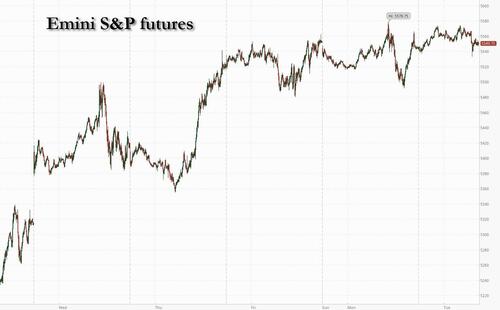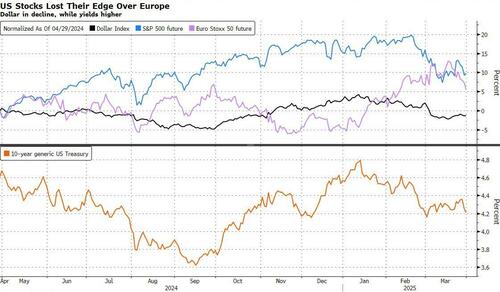Assuredly, the word of truth can be painful and uncomfortable. But it is the way to holiness, to peace, and to inner freedom. A pastoral approach which truly wants to help the people concerned must always be grounded in the truth. In the end, only the truth can be pastoral.
Distinction Matter - Subscribed Feeds
-
Site: RT - News
News organizations are increasingly controlled by wealthy owners or governments, the Liberties group has said
Media freedom is deteriorating in a number of EU countries, according to a recent report by the Civil Liberties Union for Europe (Liberties). The group has claimed that pluralism and freedom of speech are “under attack” as media companies become increasingly controlled by governments and wealthy owners.
In the Media Freedom 2025 report, the authors have outlined a range of pressures facing journalists and independent outlets, including legal and physical threats, declining ownership transparency, and political interference in public broadcasting.
The group has warned that these factors have had a significant impact on the work of the media, limiting the diversity of opinions and the independence of publications, reducing public trust in content.
Liberties has identified Bulgaria, Germany, Italy, Croatia, France, Hungary, Slovakia and Spain as among the EU member states where the situation is most alarming. According to the report, public broadcasters in several of these countries are routinely manipulated by political interests, and legal protections for media workers remain weak or poorly enforced.
The group also recorded at least 156 physical or verbal attacks on journalists in 2024, including cases of police intimidation and criminal defamation charges. In some states, the report notes, strategic lawsuits against public participation (SLAPPs) are still being used to silence critical reporting, despite the EU’s recent efforts to curb their abuse.
Read more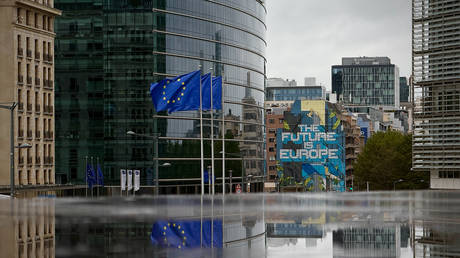 EU denies Russian news agency accreditation
EU denies Russian news agency accreditation
Liberties also noted that Russian and Belarusian journalists working in the bloc have repeatedly faced threats and harassment and become targets of spyware, raising concerns over their safety and what effect it could be having on their work.
Earlier this month, Russian state news agency RIA Novosti reported that the EU had denied its journalists accreditation for 2025, citing sanctions regulations. The outlet has appealed the decision, referencing the EU Charter of Fundamental Rights and earlier EU statements that had assured journalistic activity would not be restricted.
The rejection follows a broader crackdown on Russian media in the EU since the escalation of the Ukraine conflict in 2022. The European Council has banned Russian outlets such as RT, Sputnik and RIA across the bloc. In its 16th sanctions package adopted this February, the bloc also added eight more Russian news outlets to the blacklist, including Lenta.ru and the Zvezda TV channel.
Russian officials have repeatedly condemned the bans, arguing EU officials are afraid of people seeing a viewpoint that differs from the Western mainstream narrative and drawing their own conclusions about current events.
-
Site: AsiaNews.itAs a young priest, the Verbite was a missionary in rural Ghana. Archbishop of Tokyo since 2017, he was elected president of Caritas Internationalis by the assembly of delegates two years ago. At 66, he leads a Church that is coming to terms with the loneliness and contradictions of the great metropolises, stressing the dignity of every human life. During the synod a few months ago, he said, 'even Europe today is becoming a periphery.'
-
Site: Novus Motus LiturgicusHere are some great photos from our Ambrosian correspondent Nicola de’ Grandi of the Portinari Chapel at the Basilica of St Eustorgio in Milan. They were taken during a special night-time opening made possible by a new lighting system; as one might well imagine, the Italians are extraordinarily good at this sort of thing, and more and more museums throughout the country are now offering Gregory DiPippohttp://www.blogger.com/profile/13295638279418781125noreply@blogger.com0
-
Site: PeakProsperityCommodities are poised for a significant rise due to macroeconomic shifts, potential monetary regime changes, and the depletion paradox is now patrolling the US shale oil patch.
-
Site: Henrymakow.com
 (At a festival in 2013, Carney's wife Diana stormed off after his male lover made a sexual play for him in her presence. Posting this story before the election would have undermined Carnage's gravitas so everyone including Carney's so called "opponents" ignored it.)Go woke, go broke?Canada's VERY woke new First Family: So much for the end of the lefty Trudeau era, PM Mark Carney is supported by his eco warrior wife, vegan cook daughter and non-binary child who championed Bernie SandersWant to represent all Canadians Mark? Drop your globalist gaslighting & woke climate change BS.How Canada's Conservatives Botched the Election of a Lifetime"Starting in February, Trump launched a trade war against Canada, with on-again, off-again tariffs that left Canadians reeling. A wave of nationalism swept the country, with Canadians booing the American national anthem at hockey games, boycotting U.S. products, and all but abandoning cross-border travel.This put Poilievre in a near-impossible position. Much of his base--including many of his MPs--admire Trump. But with Trump openly attacking Canada, and with Poilievre's own anti-woke rhetoric and disdain for the mainstream media, he found himself trapped. Attempts to distance himself from Trump could alienate core supporters, while embracing the American president would push away everyone else.°Poilievre needed to show he could "make a deal" with Trump--
(At a festival in 2013, Carney's wife Diana stormed off after his male lover made a sexual play for him in her presence. Posting this story before the election would have undermined Carnage's gravitas so everyone including Carney's so called "opponents" ignored it.)Go woke, go broke?Canada's VERY woke new First Family: So much for the end of the lefty Trudeau era, PM Mark Carney is supported by his eco warrior wife, vegan cook daughter and non-binary child who championed Bernie SandersWant to represent all Canadians Mark? Drop your globalist gaslighting & woke climate change BS.How Canada's Conservatives Botched the Election of a Lifetime"Starting in February, Trump launched a trade war against Canada, with on-again, off-again tariffs that left Canadians reeling. A wave of nationalism swept the country, with Canadians booing the American national anthem at hockey games, boycotting U.S. products, and all but abandoning cross-border travel.This put Poilievre in a near-impossible position. Much of his base--including many of his MPs--admire Trump. But with Trump openly attacking Canada, and with Poilievre's own anti-woke rhetoric and disdain for the mainstream media, he found himself trapped. Attempts to distance himself from Trump could alienate core supporters, while embracing the American president would push away everyone else.°Poilievre needed to show he could "make a deal" with Trump-- Spain's blackout wasn't just a technical failure. It was a political and strategic failure.Power Restored In Spain, Portugal But The Situation Reveals A Very Serious Underlying Problem..."The outage paralyzed digital payment systems, disrupted communications, and brought various modes of transportation networks to an apocalyptic standstill. While a Spanish judge has launched an investigation into whether a cyberattack was responsible, early indications suggest the culprit is likely net zero.Here's an excerpt from Michael Shellenberger at PUBLIC, who provided an uncomfortable truth about the unhinged liberals in Europe who have been hellbent on retiring fossil fuel power and nuclear generation plants, swapping for unreliable solar and wind:Despite all these warnings, political and regulatory energy in Europe remained focused on accelerating renewable deployment, not upgrading the grid's basic stability. In Spain, solar generation continued to climb rapidly through 2023 and early 2024.Coal plants closed. Nuclear units retired. On many spring days by 2025, Spain's midday solar generation exceeded its total afternoon demand, leading to frequent negative electricity prices. The system was being pushed to the limit. And today, at 12:35 pm, it broke."-WEF in Jan 2023 -Geopolitical Instability Raises Threat of 'Catastrophic Cyberattack in Next Two Years'93% of cybersecurity experts and 86% of business leaders believe global geopolitical instability is likely to lead to a catastrophic cyberattack in the next two years...
Spain's blackout wasn't just a technical failure. It was a political and strategic failure.Power Restored In Spain, Portugal But The Situation Reveals A Very Serious Underlying Problem..."The outage paralyzed digital payment systems, disrupted communications, and brought various modes of transportation networks to an apocalyptic standstill. While a Spanish judge has launched an investigation into whether a cyberattack was responsible, early indications suggest the culprit is likely net zero.Here's an excerpt from Michael Shellenberger at PUBLIC, who provided an uncomfortable truth about the unhinged liberals in Europe who have been hellbent on retiring fossil fuel power and nuclear generation plants, swapping for unreliable solar and wind:Despite all these warnings, political and regulatory energy in Europe remained focused on accelerating renewable deployment, not upgrading the grid's basic stability. In Spain, solar generation continued to climb rapidly through 2023 and early 2024.Coal plants closed. Nuclear units retired. On many spring days by 2025, Spain's midday solar generation exceeded its total afternoon demand, leading to frequent negative electricity prices. The system was being pushed to the limit. And today, at 12:35 pm, it broke."-WEF in Jan 2023 -Geopolitical Instability Raises Threat of 'Catastrophic Cyberattack in Next Two Years'93% of cybersecurity experts and 86% of business leaders believe global geopolitical instability is likely to lead to a catastrophic cyberattack in the next two years...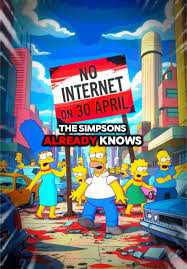 Very few Simpson's predictions come trueSimpson's Prediction for April 30, 2025Simpson Food Crisis in 2025-Catherine Austin Fitts--Despite the "trade war", the West is imposing a Chinese-style social credit systemCurrency will be replaced by a digital concentration camp where your every movement and purchase will be controlled by shutting off your money.Former Bush administration official Catherine Austin Fitts on how America's leaders gave up on the country in the 1990s, began stealing trillions and built a digital prison to control the population.
Very few Simpson's predictions come trueSimpson's Prediction for April 30, 2025Simpson Food Crisis in 2025-Catherine Austin Fitts--Despite the "trade war", the West is imposing a Chinese-style social credit systemCurrency will be replaced by a digital concentration camp where your every movement and purchase will be controlled by shutting off your money.Former Bush administration official Catherine Austin Fitts on how America's leaders gave up on the country in the 1990s, began stealing trillions and built a digital prison to control the population. Catherine Fitts: Bankers vs. the West, Secret Underground Bases, and the Oncoming Extinction EventMichael Snyder--"It Is A Full-Blown Crisis Already": Farmers Cry Out For Help As Massive Financial Losses Pile Up And Demand For U.S. Agricultural Products DisappearsMore than 1.4 billion people live in China. We send them massive amounts of soy and pork in a normal year, and that has been a very profitable arrangement for U.S. farmers. Unfortunately, demand has dried up due to the trade war, and this has thrown the U.S. agriculture industry into a state of chaos...--Experts Are Warning That There Will Be Significant Shortages In The United States By The End Of Next Month"It would be difficult to overstate the seriousness of the crisis that we are facing. Just about every single industry in the United States is extremely dependent on imports from China, and now trade with China is essentially coming to a standstill. I wish that I was exaggerating, but I am not. According to the World Trade Organization, trade between the United States and China could decline by as much as 80 percent...--
Catherine Fitts: Bankers vs. the West, Secret Underground Bases, and the Oncoming Extinction EventMichael Snyder--"It Is A Full-Blown Crisis Already": Farmers Cry Out For Help As Massive Financial Losses Pile Up And Demand For U.S. Agricultural Products DisappearsMore than 1.4 billion people live in China. We send them massive amounts of soy and pork in a normal year, and that has been a very profitable arrangement for U.S. farmers. Unfortunately, demand has dried up due to the trade war, and this has thrown the U.S. agriculture industry into a state of chaos...--Experts Are Warning That There Will Be Significant Shortages In The United States By The End Of Next Month"It would be difficult to overstate the seriousness of the crisis that we are facing. Just about every single industry in the United States is extremely dependent on imports from China, and now trade with China is essentially coming to a standstill. I wish that I was exaggerating, but I am not. According to the World Trade Organization, trade between the United States and China could decline by as much as 80 percent...--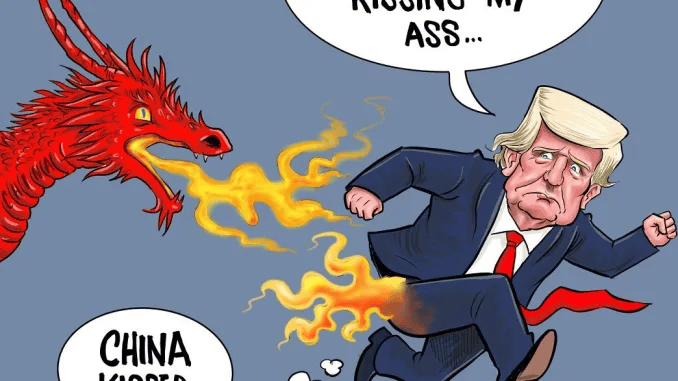 How Trump Lost His Trade War With ChinaOnly 15% of Chinese exports go to the USA. Overall, China's GDP is only 20% dependent on foreign tradeDonald Trump launched a massive trade war against China -- but it didn't end the way most Americans think. Today, we break down how China outmaneuvered the U.S., diversified its economy, and why Trump's tariffs ended up hurting American businesses far more than China's. In this video, we'll dive deep into:How China prepared years in advance to winWhy China doesn't need the U.S. consumer as much as you thinkThe myth of American economic dominanceHow U.S. allies began turning their backs on AmericaHow Trump's own tariffs backfired -- and what Reagan warned us about years agoIf you want to understand the real story behind the U.S.-China trade war -- and what it means for the future of America's global standing -- this is a must-watch.-Children in Quebec can have more than two parents, according to a Superior Court decision that now gives the provincial government 12 months to amend the Civil Code to legally recognize this type of family structure.--
How Trump Lost His Trade War With ChinaOnly 15% of Chinese exports go to the USA. Overall, China's GDP is only 20% dependent on foreign tradeDonald Trump launched a massive trade war against China -- but it didn't end the way most Americans think. Today, we break down how China outmaneuvered the U.S., diversified its economy, and why Trump's tariffs ended up hurting American businesses far more than China's. In this video, we'll dive deep into:How China prepared years in advance to winWhy China doesn't need the U.S. consumer as much as you thinkThe myth of American economic dominanceHow U.S. allies began turning their backs on AmericaHow Trump's own tariffs backfired -- and what Reagan warned us about years agoIf you want to understand the real story behind the U.S.-China trade war -- and what it means for the future of America's global standing -- this is a must-watch.-Children in Quebec can have more than two parents, according to a Superior Court decision that now gives the provincial government 12 months to amend the Civil Code to legally recognize this type of family structure.--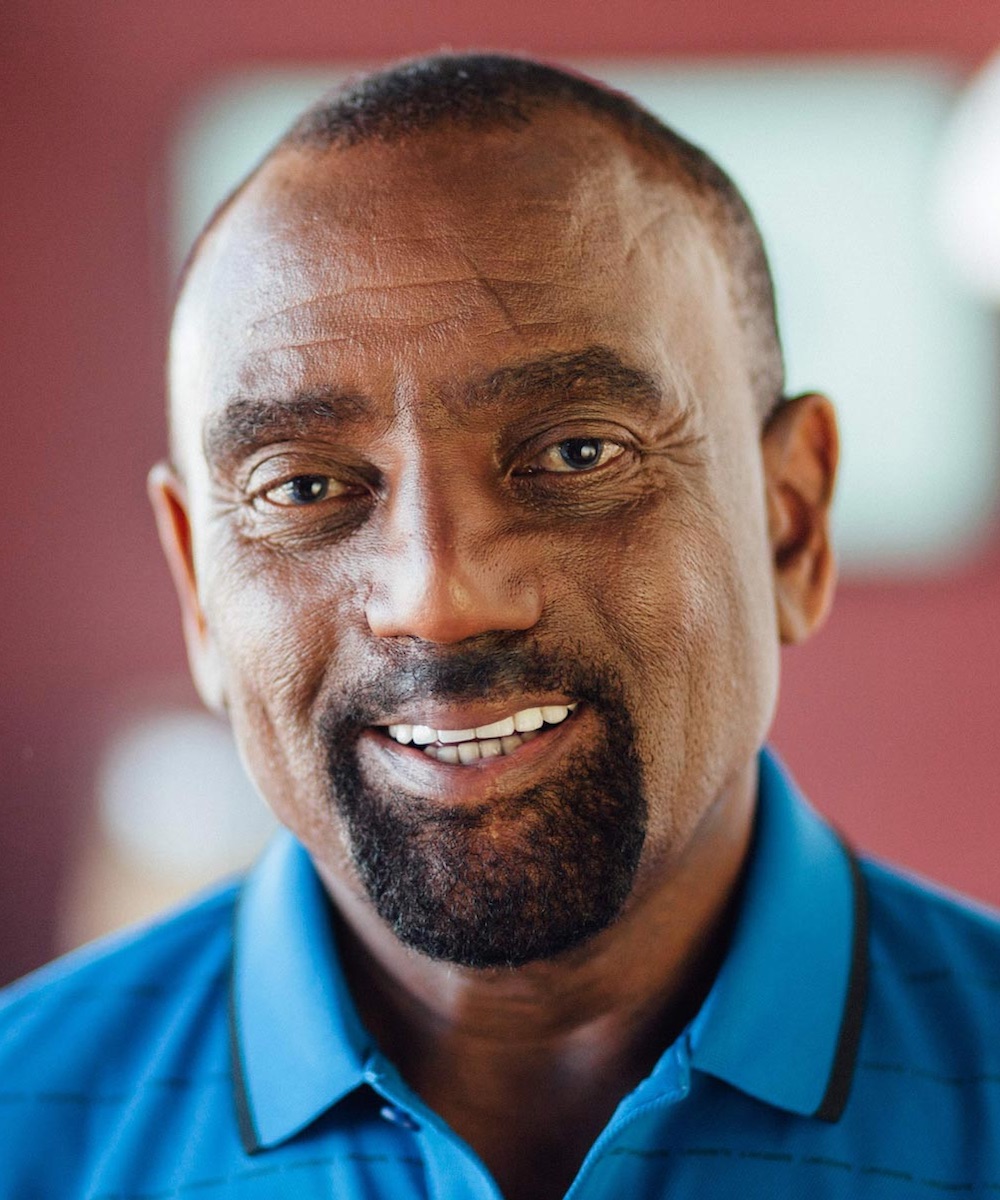 Jesse Lee Peterson - Black Pastor says we need more white babies because "white people are more innovative and creative""Other races destroy" - Watch the chins drop as black man challenges anti-white racist brainwashing-Dr. Vernon Coleman: The End of Medicine (script of video)Why and how doctors are now paid to kill their patientsIn The End of Medicine I am going to prove to you that doctors have been ordered to murder their patients and whether they realise it or not, that is, I'm afraid, exactly what they are doing.--McDonald's Hamburger after 25 years -- Doesn't spoil--Huckabee: If Iran Talks Fail, Trump Won't Be Dragged Into War, 'He'll Lead It'. Certified insane....and all the Christians Zionists said: "PRAISE THE LORD!!!"--
Jesse Lee Peterson - Black Pastor says we need more white babies because "white people are more innovative and creative""Other races destroy" - Watch the chins drop as black man challenges anti-white racist brainwashing-Dr. Vernon Coleman: The End of Medicine (script of video)Why and how doctors are now paid to kill their patientsIn The End of Medicine I am going to prove to you that doctors have been ordered to murder their patients and whether they realise it or not, that is, I'm afraid, exactly what they are doing.--McDonald's Hamburger after 25 years -- Doesn't spoil--Huckabee: If Iran Talks Fail, Trump Won't Be Dragged Into War, 'He'll Lead It'. Certified insane....and all the Christians Zionists said: "PRAISE THE LORD!!!"-- "This is my sister's husband, Ibrahim, and these are my sister's children, Omar and Nada. They were getting ready to celebrate my older brother's wedding before the war, but the war started, and the occupation killed my older brother. A few days later, the occupation bombed us, which led to their martyrdom and the martyrdom of the rest of the family members."A Way to Help GazaC'mon gold bugs, share your good fortune!-MAX IGAN - Evil Against Integrity-
"This is my sister's husband, Ibrahim, and these are my sister's children, Omar and Nada. They were getting ready to celebrate my older brother's wedding before the war, but the war started, and the occupation killed my older brother. A few days later, the occupation bombed us, which led to their martyrdom and the martyrdom of the rest of the family members."A Way to Help GazaC'mon gold bugs, share your good fortune!-MAX IGAN - Evil Against Integrity- -
Site: RT - News
The newly-released documents detail times spent in the country by infamous death camp doctor Josef Mengele and Holocaust architect Adolf Eichmann, amongst others
The Argentinean government has made public almost 2,000 declassified secret service files on hundreds of Nazi war criminals who fled to the Latin American country after the Third Reich’s defeat in the Second World War.
According to estimates, as many as 10,000 Nazis utilized so-called ‘ratlines’ to escape as the Axis powers collapsed. Infamously, around half of them are believed to have chosen Argentina –known for its reluctance to grant extradition requests — as their refuge.
The 1,850 files uploaded online by the Argentinian National Archives (AGN) on Monday included intelligence reports, photographs, and police records. The documents on “Nazi activities in Argentina” are now available to all “thanks to extensive restoration and digitization work,” the AGN said in a statement.
Among other things, the papers depict how the likes of Josef Mengele, Erich Priebke and Adolf Eichmann were able to make it to Argentina and what they did in the country.
Read more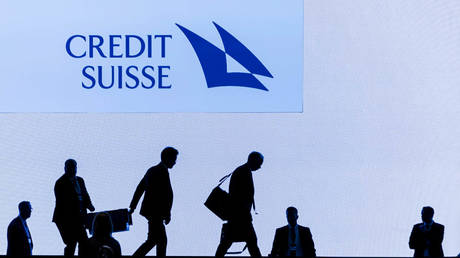 Swiss bank worked with WW2 Nazis until 2020 – US Senate
Swiss bank worked with WW2 Nazis until 2020 – US Senate
Mengele was a physician and Nazi SS officer, nicknamed the ‘Angel of Death’ for his inhumane medical experiments on prisoners at the Auschwitz concentration camp. The published records show he entered Argentina in 1949 under the name of Gregor Helmut and then openly lived in the country.
“References obtained from different sectors of the German community allowed us to learn that he was commander of the Assault Guards and, at the same time, doctor in the German extermination camp of Auschwitz,” one of the files on Mengele read.
The newly-published papers also included the 1995 extradition documents for Priebke, a mid-level SS commander, who had been in charge of a unit responsible for the massacre of 335 Italian civilians at the Ardeatine Caves outside Rome in 1944.
They also shed light on the time that Eichmann, a high-ranking SS official often described as the logistics chief of the Holocaust, spent in Argentina. He was kidnapped in Buenos Aires in 1960 by Mossad agents and hanged for his crimes by Israel two years later.
The files in question were declassified in 1992 under a decree from then-Argentine President Carlos Menem, but they could only be viewed in a specially designated room at the AGN.
READ MORE: CIA files reveal secret search for Hitler in 1950s
The country’s current leader Javier Milei ordered that the Nazi papers be released to the general public in March on a request from the US Jewish human rights organization, the Simon Wiesenthal Center, which is currently investigating links between Swiss bank, Credit Suisse, and Nazi Germany.
-
Site: RT - News
Hungary’s parliament has approved a bill to withdraw from the International Criminal Court
Hungary’s National Assembly has voted to withdraw from the International Criminal Court (ICC), Foreign Minister Peter Szijjarto has announced. He described the institution as biased and discredited.
The decision was passed with a more than two-thirds majority on Tuesday.
“The Hungarian Parliament just voted to withdraw from the @IntlCrimCourt. With this decision, we refuse to be part of a politicized institution that has lost its impartiality and credibility,” Szijjarto wrote on X.
Earlier this month, Hungarian Prime Minister Viktor Orban accused the ICC of losing its impartiality and becoming a “political tribunal.” He announced his intention to end Budapest’s participation during a visit by Israeli Prime Minister Benjamin Netanyahu to Hungary.
Last November, the ICC issued arrest warrants for Netanyahu and former Defense Minister Yoav Gallant, as well as three figures in the Hamas leadership, accusing them of war crimes and crimes against humanity in Gaza.
READ MORE: ICC responds to appeal of Netanyahu arrest warrant
US President Donald Trump has sanctioned the ICC and its chief prosecutor Karim Khan for going after top Israeli officials. The US is not a party to the Rome Statute, the ICC’s founding treaty, and neither are China, Russia, and Israel, among others.
Read more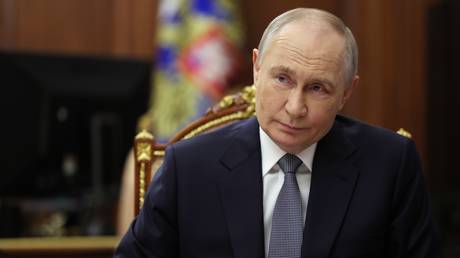 Putin ICC arrest warrant invalid in Italy – local media
Putin ICC arrest warrant invalid in Italy – local media
In March of 2023, the ICC issued arrest warrants for Russian President Vladimir Putin and children’s rights commissioner Maria Lvova-Belova over alleged unlawful deportation and transfer of children from former Ukrainian territories. Moscow has criticized the order as “null and void,” insisting that the children were evacuated from the front line for their own safety, and can be returned to their legal guardians upon request.
The judicial body lacks the ability to enforce its warrants, and relies on member states to detain and transfer suspects.
Hungary’s withdrawal requires notifying the UN Secretary-General, after which it will take effect one year later. Until then, Hungary remains obligated to cooperate with the ICC under the terms of the Rome Statute.
-
Site: Mises InstituteWhen modern progressives claim to support equity, what they really mean is the confiscation of wealth and transferal of private property to politically-favored groups. These policies have a sorry history from Reconstruction and continued through the 20th century communist regimes.
-
Site: Zero HedgeArizona Legislature Passes Bitcoin Reserve Bills, Moving Closer To Stockpiling CryptoTyler Durden Tue, 04/29/2025 - 12:40
Authored by Turner Wright via CoinTelegraph.com,
Lawmakers in the Arizona House of Representatives passed two bills that could allow the state to adopt a reserve using Bitcoin or other cryptocurrencies.
In a third reading on April 28 of Senate Bill 1025 (SB1025), a proposal to amend Arizona’s statutes to allow for a strategic BTC reserve, 31 members of the Arizona House voted in favor of the bill, with 25 opposed. A similar bill, SB1373, to establish a state-level digital assets reserve, passed with 37 lawmakers in favor and 19 voting nay.
“This bill basically takes the approach that probably 15 other states are considering the same legislation nationwide that allows the treasurer to invest up to 10% into, probably mainly Bitcoin but other things as well,” said State Representative Jeff Weninger on SB1025.
“I think this probably would start as a ‘may’ for the foreseeable future, but as things continue to pivot towards Bitcoin and these things, would have that already in place in the future.”
Voting for SB1025 in the Arizona House of Representatives on April 28. Source: Arizona State Legislature
The approvals bring the bills closer than any other state-level initiative in the US to getting a cryptocurrency or Bitcoin strategic reserve signed into law. Similar legislation proposed in New Hampshire passed the state’s House in April and is expected to head to the Senate for a full floor vote soon.
Arizona Governor Katie Hobbs announced on April 17 that she intended to veto any bill until lawmakers had a “serious, bipartisan funding solution that protects healthcare for Arizonans with disabilities.” However, with the passage of such legislation on April 24, the governor could be more open to signing SB1025 or SB1373 into law.
Federal plans to establish a national crypto reserve
The state-level efforts to create Bitcoin reserves come amid a push from US President Donald Trump and Republican lawmakers to do the same in the federal government.
Trump signed an executive order in March with a proposal for a “Strategic Bitcoin Reserve” and a “Digital Asset Stockpile.”
Wyoming Senator Cynthia Lummis, a crypto advocate, proposed that Congress pass legislation that could allow the US government to hold more than 1 million BTC, in part through crypto seized through civil or criminal forfeiture. Some lawmakers have suggested Lummis’s bill was an attempt by Congress to codify Trump’s executive order into law.
-
Site: Zero HedgePakistan Shoots Down Indian Spy Drone Over Kashmir As Forces On High AlertTyler Durden Tue, 04/29/2025 - 12:20
Pakistan's military says it shot down an Indian spy drone in the Kashmir region, soon after the country's defense chief warned that intelligence shows an Indian army incursion is 'imminent'.
The unmanned drone reportedly breached the Line of Control (LOC) in Kashmir, Pakistani state-run media said, and it was subsequently shot down amid the air space incursion. Pakistani defense officials described to The Associated Press that the drone flew hundreds of feet into Pakistani-administered Kashmir.
 Illustrative: the type of Indian drone believed downed in Kashmir.
Illustrative: the type of Indian drone believed downed in Kashmir.
Defense Minister Khawaja Asif the day prior confirmed the nation's military is currently on high alert and he had "reinforced our forces" - after multiple days of sporadic exchanges of gunfire along unspecified border posts.
"In that situation, some strategic decisions have to be taken, so those decisions have been taken," Asif told Reuters, also ominously describing that Islamabad would only consider using its nuclear arsenal in response to "a direct threat to our existence."
There's as yet been no noticeable incursion, and it remains unclear what evidence for this forecast Pakistan's military and intelligence services might have.
Last Tuesday's deadly militant attack on tourists in Kashmir, which saw 26 Indian tourists get executed after the gunmen sought to identify Hindus among the group, resulted in the Indian government promptly accusing Pakistan of harboring the Islamist terrorists which committed the atrocity, which Islamabad angrily rejected.
The nuclear-armed neighbors have already fought two historic wars over the Kashmir region, and fears are rising that another one may soon be on the horizon - also after both sides have sent military reinforcements to the respective regions they administer. Amid a massive manhunt, India identified two detained suspected militants as Pakistani.
The New York Times described Saturday that "Pakistani solders fired at an Indian position first and India responded in kind, according to local news reports, which said that "the exchange was brief and that there were no casualties." Precise locations of these live fire incidents have not been disclosed.
Missile and nuclear saber-rattling has meanwhile ensued:
India’s navy test-fired missiles on Sunday, showcasing its ability to carry out “long-range, precision offensive” strikes, as tensions with Pakistan rise after last week’s terrorist attack in Indian-administered Kashmir that killed 26 civilians.
“Indian Navy ships undertook successful multiple anti-ship firings to re-validate and demonstrate readiness of platforms, systems, and crew for long-range precision offensive strike,” the navy posted on X, as the prime minister, Narendra Modi, promised a “harsh response” to the attack at a tourist site, the deadliest against civilians in Kashmir in 25 years.
As for the other side, a Pakistani minister, Hanif Abbasi (though he's not in defense or security) days ago warned that Pakistan's nuclear arsenal of more than 130 missiles was "not kept as models" and was aimed “only for India … these ballistic missiles, all of them are targeted at you" - The Guardian noted.
The United Nations has urged restraint, and Pakistan has called for an independent investigation into the Kashmir terror attack, which it says it had nothing to do with. It has also called on Russia and China to mediate and assist with a potential investigation.
If gunfire continues to be exchanged between the two militaries, also amid reports that Pakistani visa holders are being promptly booted from the country amid the diplomatic crisis - clashes could accelerate toward open war.
India's Chief Minister of Jammu and Kashmir Omar Abdullah has meanwhile said there must be a "decisive fight against terrorism and its origin." Indian officials have continued to heap accusations that ultimately Islamabad either supports these groups or at least turns a blind eye.
Pakistan ACCUSES India of running terror network
— RT (@RT_com) April 29, 2025
Armed Forces spox claims NO EVIDENCE to suggest Pakistan's role in Pahalgam attack pic.twitter.com/xwdPOMpWUoMore observations via Rabobank...
* * *
Pakistan just warned of imminent India military action against it in response to a recent terror attack in Kashmir, to which China stated: “As Pakistan's ironclad friend and all-weather strategic cooperative partner, China fully understands Pakistan's legitimate security concerns and supports Pakistan in safeguarding its sovereignty and security interests,” with rumours it and Turkey are sending Pakistan weapons.
India will surely be looking for mirroring statements and actions from those who want more trade with it. The UK and the EU aren’t going to provide them; BRICS is a joke given what C just said about I, via P; and that only leaves the US.
-
Site: AsiaNews.itSources told AsiaNews that local priests were summoned yesterday to ratify the choice of Fr Wu Janlin, vicar general, a loyal Party member. Another election was held in the Diocese of Xinxiang, in Hebei, whose underground bishop has been arrested several times. During the sede vacante period, Beijing is reiterating the autonomy of the Church in China to test Francis's successor over the agreement.
-
Site: LifeNews
The 2025 Federal election resulted in an increase of new pro-life MPs and the re-election of every pro-life incumbent.
“We congratulate and celebrate the 42 pro-life candidates whom we green-lit and who were elected last night,” said Jeff Gunnarson, National President of Campaign Life Coalition (CLC). “We especially congratulate the six new pro-life MPs who ran excellent campaigns and encourage them to bring the pro-life voice into our country’s hall of power.”
While the election was hailed by many as the most important in decades, tragically, the leaders of the mainstream parties abandoned the over 100,000 preborn children targeted annually by abortion.
“Prime Minister Mark Carney, albeit with a projected minority government, has promised to expand the Liberal Party’s ungodly policies that have turned Canada into a death machine destroying countless victims—not only the preborn but also the sick, elderly, disabled, and others who have been let down by the social system and continue to be killed by euthanasia,” said Gunnarson.
Follow LifeNews on the MeWe social media network for the latest pro-life news free from Facebook’s censorship!
It was last month that Carney publicly declared his “unreserved” support for abortion, stating he “absolutely supports a woman’s right to choose” and would defend it “proudly and consistently.” The Liberal election platform pledged “permanent” taxpayer funding for abortion to continue across Canada and abroad and IVF subsidies of up to $20K per cycle.
Gunnarson also criticized the Conservative Party for treating the preborn child as a political liability and becoming virtually indistinguishable from the Liberals on foundational issues of life, marriage, and family. Poilievre defended abortion on more occasions than Carney and even undermined official Conservative Party policy (which protects free votes on matters of conscience), stating in the party’s election platform that under his leadership there will be “no laws, rules or regulations passed restricting abortion.”
Jack Fonseca, CLC’s Director of Political Operations, noted that Poilievre blew a massive lead in the polls, even losing his seat, by parroting many of the Liberals’ talking points, including Carney’s anti-life, anti-family stances. “This proves, once again, that trying to appear more pro-abortion and pro-LGBT than the Libs doesn’t win elections for the Conservative Party,” he said. “Failure to distinguish from the Liberals on moral issues results in electoral failure, every time.”
Gunnarson warned that difficult times may be ahead for Canadians who cherish life, family, and faith. “If Liberal policies usher in a time of chastisement, it is only God rendering to Canada what it deserves for abandoning His moral order—especially His commandment against murder, as it applies to preborn children, the sick, and the elderly. May God have mercy on our country.”
CLC thanks the almost 160 candidates it green-lit this election who ran principled campaigns in defence of life, including those representing the Conservative Party of Canada, the People’s Party of Canada, the Christian Heritage Party, the United Party of Canada, and others.
LifeNews Note: Campaign Life Coalition is a national, non-profit organization involved in political action and advocacy for legal and cultural change in Canada with respect to protecting human life & the family. For more info visit campaignlifecoalition.com.

The post More Pro-Life MPs Elected to Canadian Parliament Despite Liberal Party Victory appeared first on LifeNews.com.
-
Site: Mises InstituteNormal people suffer expensive power and blackouts while Europe's ruling regimes double down on unreliable "green" energy.
-
Site: RT - News
The US president has claimed he is “saving that nation” by trying to mediate between Moscow and Kiev
Ukraine could face a significant defeat in the near future if it does not sit down at the negotiating table with Russia, US President Donald Trump has warned.
Trump made his comments in an interview with The Atlantic published on Monday. When asked whether he has sympathy for Kiev, the president replied by saying that his policy is aimed at “saving” Ukraine and warned that continued conflict would not bring the country any good.
“I think I’m saving that nation. I think that nation will be crushed very shortly,” he said, adding that Russia has a “big war machine. Let’s face it.”
Separately, US Vice President J.D. Vance also emphasized on Monday that Kiev would not win the conflict against Moscow. “If this doesn’t stop, the Ukrainians aren’t winning the war,” Vance, a US Marine Corps veteran, told Charlie Kirk. He also said it was “weird” to expect Russia to collapse because of the ongoing hostilities.
Read more Ukraine won’t win – Vance
Ukraine won’t win – Vance
The US has grown increasingly frustrated with the slow pace of negotiations between Washington, Moscow and Kiev. Secretary of State Marco Rubio warned last week that the US could walk away from the talks altogether if the process stalls.
Moscow has said it has always been ready to engage in peace talks, provided they ensure a permanent solution that addresses the root causes of the conflict. It opposed a proposal for a temporary ceasefire, pointing to past experience when Kiev and its Western backers used a hiatus to rearm the Ukrainian military.
Last week, Trump himself also admitted that Russian President Vladimir Putin was easier to deal with than Ukraine’s Vladimir Zelensky. “I think Russia is ready… I think we have a deal with Russia. We have to get a deal with Zelensky,” Trump told journalists at the time. The Ukrainian leader had earlier publicly rejected a reported key point in the proposed US peace framework by refusing to consider recognizing Crimea as Russian territory.
The Trump administration has been pushing for a resolution to the conflict since he took office in early 2025. Washington is also seeking to secure a minerals extraction agreement with Kiev to help offset the billions of dollars the US had spent on military and financial assistance to Ukraine under Trump’s predecessor, Joe Biden.
-
Site: RT - News
Compromise is sometimes necessary for survival, Alexander Stubb has told The New York Times
Finnish President Alexander Stubb has suggested that Ukraine will have to make certain concessions to Russia in order to ensure its survival and continue receiving Western military support. Moscow has dismissed any resolution of the conflict that allows Ukraine to remain a threat.
On Sunday, Stubb shared his thoughts with The New York Times on how to align US President Donald Trump more closely with the positions held by Kiev and Washington’s European NATO allies, as the White House seeks to mediate a compromise in the ongoing Ukraine conflict.
He drew a historical parallel between Ukraine and Finland, which participated in Nazi Germany’s 1941 invasion of the USSR to reclaim territory it had lost in the Winter War earlier. As a result of being on the losing side, Finland faced military restrictions and observed neutrality during the Cold War. It formally joined NATO only in 2023, after years of military cooperation with the US-led alliance.
Stubb reflected on the essence of statehood, comprising land, sovereignty, and independence. He noted that Finland lost two of these three elements in the 1940s, adding, “If we get at least two out of the three for Ukraine, I think it’s great.”
Read more Ukraine one of the world’s most corrupt countries – Trump adviser
Ukraine one of the world’s most corrupt countries – Trump adviser
Earlier this month, Ukraine’s Vladimir Zelensky publicly rejected American proposals reported in the media. Subsequently, Kiev and its European backers crafted a counteroffer for Trump’s consideration.
Stubb suggested that the two plans should be “repackaged” into a viable proposal through “a little bit of creative writing.” If a ceasefire with Russia is achieved, Ukraine could be armed “to the teeth” by European NATO members, with a “backstop from the US,” he asserted. The current objective is to “maximize the pressure” on Russian President Vladimir Putin, Stubb added.
Russia perceives the Ukraine conflict as a NATO proxy war led by a Western-backed “neo-Nazi regime” in Kiev.
Moscow has repeatedly criticized the EU’s continued flow of armaments to Ukraine, arguing that Western European nations appear more interested in prolonging the fighting rather than resolving the conflict diplomatically.
-
Site: LifeNews
OB-GYNs did not leave states with pro-life laws after the Supreme Court overturned Roe v. Wade in 2022, despite claims to the contrary, a recent study found.
In fact, pro-life states saw increases in OB-GYNs, rather than decreases, The College Fix reported on the study. Published in JAMA Network Open, the study found that OB-GYNs increased by 8.3% in states where life is protected, 10.5% in states that lean pro-life, and only 7.7% in states where abortions are legal.
The study also found that the percentage of those choosing to become OB-GYNs as a career has not decreased since Dobbs v. Jackson returned the issue of abortion to individual states.
Please follow LifeNews.com on Gab for the latest pro-life news and info, free from social media censorship.
The College Fix reported that the findings contradict certain claims that pro-life laws would drive OB-GYNs out of state and leave pregnant women without any resources.
“As more clinicians leave those states, as more maternity care deserts happen, we will see poorer outcomes,” Dr. Stella Dantas, president of the American College of Obstetricians and Gynecologists (ACOG), told Mother Jones in May 2024.
The same Mother Jones article reported that 64% of practicing OB-GYNs who responded to a Kaiser Family Foundation survey said that the Dobbs ruling worsened maternal mortality. However, studies have shown that the maternal mortality rate actually fell the year after several states passed pro-life legislation.
The College Fix also reported that Dr. Verda Hicks, the former president of the ACOG, claimed in 2023 that OB-GYNs would get burnt out from being “prevented from providing the expert care that they are trained to provide.”
“Little do they [those making the claims] know that only 14 percent of OB/GYNs inject chemicals into babies to cause them to have heart attacks or rip them apart in the womb,” The College Fix reported. “So while abortion is an important part of what they consider to be medicine, it is not vital to the true healthcare provided by other people, leaving the alleged experts once again sitting alone in their echo chamber.”
LifeNews Note: Hannah Hiester writes for CatholicVote, where this column originally appeared.

The post States Banning Abortions Gained More OBGYNs Than States Where Abortion is Legal appeared first on LifeNews.com.
-
Site: PeakProsperityRenewable energy causes first major blackout in Spain, Portugal, and France. Amazon accused of ties to Chinese propaganda. Canada elects Mark Carney as PM. D'Oh!
-
Site: LifeNews
A bombshell study published Monday has revealed nearly 11% of women experience severe or life-threatening complications after an abortion via the drug mifepristone – a rate that is 22 times higher than indicated on the drug’s label approved by the federal Food and Drug Administration (FDA).
Our team analyzed 865,727 mifepristone abortions (2017–2023), 28 times larger than all FDA clinical trials combined.
Here’s what we found:
· 10.93% of women experienced severe or life-threatening events within 45 days of taking Mifepristone, including sepsis, hemorrhage, blood… pic.twitter.com/3EAoGf0R75— Ethics and Public Policy Center (@EPPCdc) April 28, 2025
Please follow LifeNews on Rumble for the latest pro-life videos.
A research team at the Washington, D.C.-based Ethics and Public Policy Center (EPPC) analyzed 865,727 mifepristone abortions that occurred between 2017 and 2023, a number that is “28 times larger than in all FDA clinical trials combined.”
“This largest-known study of the abortion pill is based on analysis of data from an all-payer insurance claims database,” write Jamie Bryan Hall and Ryan T. Anderson of EPPC for the study titled “The Abortion Pill Harms Women.”
According to the study, “10.93 percent of women experience sepsis, infection, hemorrhaging, or another serious adverse event within 45 days following a mifepristone abortion.”
“The real-world rate of serious adverse events following mifepristone abortions is at least 22 times as high as the summary figure of ‘less than 0.5 percent’ in clinical trials reported on the drug label,” Hall and Anderson observe.
The FDA began to gradually relax restrictions on mifepristone during the Obama and Biden administrations, ultimately allowing the drug to be used up to 10 weeks of pregnancy, with no required in-person doctor visits or reporting of adverse events.
The weakened restrictions on mifepristone appear to have enabled a drug-induced abortion to become a “DIY” (do-in-yourself) procedure.
“[A] mifepristone abortion now requires as little as one telehealth visit with any approved healthcare provider (not necessarily a physician),” Hall and Anderson observe. “[A] woman may self-administer drugs obtained from a mail-order pharmacy.”
Easy access to DIY abortions has occurred just as their prevalence has also increased dramatically.
“Chemical abortions—the vast majority of which are performed using a combination of mifepristone and misoprostol—now account for roughly two-thirds of all abortions in the United States,” the researchers explain.
Given the finding that complications from drug-induced abortions appear to be far greater than what the FDA has reported, EPPC calls for the agency to “immediately reinstate its earlier, stronger patient safety protocols to ensure physician responsibility for women who take mifepristone under their care, as well as mandate full reporting of its side effects.”
“The FDA should further investigate the harm mifepristone causes to women and, based on objective safety criteria, reconsider its approval altogether,” the authors assert.
“Many patients obtain mifepristone through the mail through ‘telemedicine’ apps that require little more than a few clicks and virtually no evaluation,” writes psychiatrist and EPPC scholar Dr. Aaron Kheriaty at his column “Human Flourishing.”
“The pill is then shipped across state lines, making it almost impossible for states to regulate or monitor its use,” he explains. “Fierce debates about abortion in our society often prevent objective analysis of data on the topic; however, given that chemical abortions now account for two-thirds of all abortions, these findings deserve close scrutiny and attention.”
Based on the study’s results, Missouri Republican Sen. Josh Hawley sent a letter Monday afternoon to FDA Commissioner Dr. Marty Makary, urging him to “restore the FDA’s longstanding safety measures” regarding mifepristone.
“You have stated publicly: ‘If the data suggests something or tells us that there’s a real signal, we can’t promise we’re not going to act on that data,’” Hawley reminded Makary. “The time to act is now. It is time to revisit and restore the FDA’s longstanding safety measures governing mifepristone.”
Similarly, Montana Republican Sen. Steve Daines reacted to the study’s shocking results.
“The science is clear: the abortion pill is not safe for women, and it never has been,” he said. “This recent study is proof that pro-abortion advocates care more about promoting their radical agenda than they do about women’s health. I urge the FDA to reinstate safety protocols for mifepristone, so that we can protect the health of women and uphold the dignity of life.”
Alliance Defending Freedom and the American Association of Pro-Life Obstetricians and Gynecologists likewise posted reactions to the study on the X platform.
LifeNews Note: Susan Berry writes for CatholicVote, where this column originally appeared.

The post 11% of Women Who Take the Abortion Pill Experience Major Complications appeared first on LifeNews.com.
-
Site: RT - News
Michael Waltz has urged Washington to closely monitor how Kiev is spending the financial aid it receives
US National Security Adviser Michael Waltz has called for proper oversight of the financial assistance Washington provides to Kiev. In a Monday interview with Fox News, the top state official called Ukraine one of the most corrupt nations in the world.
The US Congress has authorized roughly $175 billion for Ukraine since 2022, although a significant portion of that funding has gone to American industries and government activities related to the conflict.
Waltz’s comment comes days after US President Donald Trump held a face-to-face conversation with Ukraine’s Vladimir Zelensky on the sidelines of Pope Francis’ funeral at the Vatican.
“I will say Ukraine was one of, and is one of, the most corrupt countries in the world,” Waltz said, highlighting that Washington has to “always guard the taxpayer dollars.”
The official also rebuked the administration of Trump’s predecessor for its failure to provide proper oversight of the way Kiev was spending the financial aid provided by the White House at the time.
“We have to keep a hard eye on that, […] but secondly we have to find opportunities to end the war,” he said.
Waltz, who had previously said that Washington must be reimbursed by Kiev for the “investments” it has made in the conflict, also accused the Ukrainian leader of intractability. He recalled the shouting match which took place at the White House earlier this year.
Read more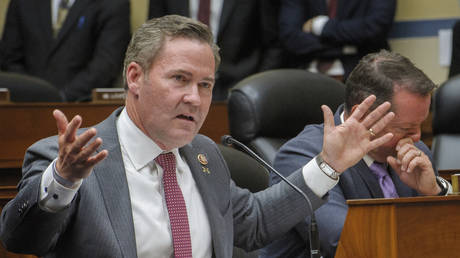 Ukraine must pay US back – national security adviser
Ukraine must pay US back – national security adviser
“Rather than trying to correct the President of the US and the Vice President in the Oval Office when he was invited there for the first meeting, he could have sat side by side with the president, signing a minerals deal that bound our economies,” the adviser said.
Washington and Kiev have been discussing a deal for weeks that would grant the US access to Ukraine’s deposits of rare-earth minerals.
The Trump administration insists that the agreement should be used to compensate the US for past aid to Ukraine. Kiev, however, has maintained that the assistance was provided unconditionally.
According to Germany’s Kiel Institute for the World Economy, as of October 2024, the US had provided Ukraine with approximately $92 billion in financial and military assistance. Meanwhile, the US-based Council on Foreign Relations estimated that Washington’s financial assistance to Kiev amounted to $195 billion as of April 2024, with $128 billion worth of the aid having gone straight to the government of Ukraine.
Pentagon Inspector General Robert Storch reported last November that “corruption continues to complicate Ukraine’s efforts to achieve its EU and NATO aspirations,” particularly due to multiple scandals in the Defense Ministry.
-
Site: non veni pacem
Virginia Giuffre, who accused Britain’s Prince Andrew and other influential men of sexually exploiting her as a teenager trafficked by financier Jeffrey Epstein, has died. She was 41.
Giuffre died by suicide Friday at her farm in Western Australia, her publicist confirmed.
“Virginia was a fierce warrior in the fight against sexual abuse and sex trafficking. She was the light that lifted so many survivors,” her family said in a statement. “Despite all the adversity she faced in her life, she shone so bright. She will be missed beyond measure.”
Her publicist Dini von Mueffling described Giuffre as “deeply loving, wise and funny.”
“She adored her children and many animals. She was always more concerned with me than with herself,” von Mueffling wrote in a statement. ”I will miss her beyond words. It was the privilege of a lifetime to represent her.”
EDITOR’S NOTE: This story includes discussion of suicide. If you or someone you know needs help, the national suicide and crisis lifeline in Australia is available by calling 13 11 14. In the U.S., it is available by calling or texting 988. There is also an online chat at 988lifeline.org
The American-born Giuffre, who lived in Australia for years, became an advocate for sex trafficking survivors after emerging as a central figure in Epstein’s prolonged downfall.
-
Site: OnePeterFive

I finally watched the film Conclave and, as I had expected, I was distinctly unimpressed by it. It was very well produced and right up until the end was quite convincingly and realistically portrayed and then… …it descended into ludicrous farce. The result is a highly pernicious, not to say diabolical, film. Why? Because the beginning air of realism and apparent normality…
-
Site: LifeNews
Last week, Amna Nawaz of PBS News asked Dr. Marty Makary, new commissioner of the Food and Drug Administration, if he planned to impose restrictions on the distribution and use of mifepristone and misoprostol in chemical abortions. The FDA approved mifepristone for chemical abortions in 2000, after a selective, limited study determined that it was “safe and effective.” Since 2016, citing that conclusion, the FDA eroded all safeguards on chemical abortions. Today, chemical abortions can be prescribed in every state, without an in-person visit, by someone who is not a physician, and distributed through the mail. Women self-administer the abortion drusg at home without a required follow-up visit. Clinics or administrating entities are not required to report adverse effects.
Even so, Dr. Makary said that he “ha(d) no plans to take action on mifepristone,” but then added:
I believe as a scientist, you got to evolve as the data comes in.
And, as you may know, there is an ongoing set of data that is coming into FDA on mifepristone. So, if the data suggests something or tells us that there’s a real signal, then I — we can’t promise we’re not going to act on that data that we have not yet seen.
Almost on cue, a new report was released on Monday by the Ethics and Public Policy Center.
Please follow LifeNews on Rumble for the latest pro-life videos.
Whereas the FDA originally relied on data from 10 clinical trials with nearly 31,000 participants, the new data is based on the “largest-known study of the abortion pill” and “is based on analysis of data from an all-payer insurance claims database that includes 865,727 prescribed mifepristone abortions from 2017 to 2023.” In other words, this data is the most recent available and is far more representative of the chemical abortions typically obtained today. The women in this dataset are,
[B]roadly representative of the women who obtain mifepristone abortions in the U.S.; they are not a prescreened group of generally healthy women recruited into various clinical trials conducted at different times around the world.
Also, the medical care these women received is common to chemical abortions and not “the carefully controlled regimen of care that ordinarily prevails in clinical trials.”
The results, according to this analysis, is that the abortion pill harms women. Some of the disturbing findings found that 10.93% of women experience sepsis, infection, hemorrhaging, or another serious adverse event within 45 days following a mifepristone abortion. The real-world rate of serious adverse events following mifepristone abortions is at least 22 times as high as the summary figure of “less than 0.5%” in clinical trials reported on the drug label.
Of course, even if the new study suggested that mifepristone is “safe and effective” for women, it would still be a dangerous lie to claim, as proponents have, that it is “like Tylenol.” As Ob-Gyn physician Dr. Christine Francis argued in a What Would You Say video, having an abortion is nothing like treating a headache. When Tylenol works, pain is eliminated. When mifepristone works, a developing human life in the womb is ended. “If the medication is successful,” Francis observed, “someone always dies. That is the furthest thing from safe.”
Even more, women are not sufficiently warned that they are, to put it gently, likely to see the result of their chemical abortion. What the EPPC study does not quantify is the emotional and psychological trauma that women have experienced.
Also, like the data used by the FDA to justify its systemic reduction of all restrictions on mifepristone, the comparison with Tylenol is misleading and false. The claim is based on the total number of hospitalizations of each, but that comparison is “terribly misleading” since so many more people take Tylenol than mifepristone. When compared on a per capita basis, there is no comparison.
In the interview with PBS News, Dr. Makary called himself “a data guy.” I believe that he is. At the very least, these data findings require a reexamination of the FDA’s current regulations and protocol on chemical abortions. The Ethics and Public Policy Center further recommends:
The FDA should reinstate the original patient safety protocols that were required when mifepristone was first approved. Doing so will likely reduce the harms to women and permit better monitoring to determine whether this drug should remain on the market.
Certainly, it should not remain on the market. But this study is incredibly important to reverse some of the damage the FDA has caused. The stakes could not be higher. Today, the vast majority of chemical abortions “are performed using a combination of mifepristone and misoprostol,” and “chemical abortions now account for nearly two-thirds of all abortions in the United States.” Fifteen years ago, the world learned that the mass-murdering abortionist Kermit Gosnell had been enabled by a severe lack of oversight and regulation. This new report from the EPPC suggests that chemical abortion is its own “house of horrors.”
LifeNews Note: John Stonestreet writes for BreakPoint.org. This article was originally posted here.

The post New Report Confirms Abortion Drug is Dangerous for Women appeared first on LifeNews.com.
-
Site: Zero HedgeDeep State JOLTED: Government Job Openings Plummet To 5 Year Low As Total Hires, Quits JumpTyler Durden Tue, 04/29/2025 - 10:59
One month after the BLS reported that in February the labor market reverted to its deteriorating trendline, when the US had 7.568 million job openings (missing estimates of 7.655 million), a drop from the 7.762 million in January (revised from 7.740 million), and down 877,000 from the prior year, moments ago the latest JOLTS report showed that in March the labor market continued to deteriorate, and the number of job openings declined again, this time by 288K, from a downward revised 7.480MM to 7.192MM, the lowest since September 2024.
According to the BLS, the drop in job openings was across most sectors, with an emphasis of construction, transportation, private education and real estate. The lone increase was reported in finance and insurance.
However, the biggest surprise was precisely where we noted last month that something doesn't make sense.
Recall last month we said that "as always, there is a reason to doubt this particular set of numbers - just as there was reason to doubt every set of numbers from Biden - because according to the February JOLTS report, the number of Federal Government job openings was essentially flat both sequentially and YoY."
Well, not anymore, and in March, the number of government job openings plunged by 36K, from 134K to just 98K, the first sub-100K print since the covid crash, some five years ago!
In the context of the broader jobs report, in February the number of job openings was 109 more than the number of unemployed workers (which the BLS reported was 7.083 million), down from 428K the previous month, and the lowest differentials since the covid crash.
Still, as noted previously, until this number turns negative, the US labor market is not demand constrained, and a recession has never started in a period when there were more job openings than unemployed workers.
Said otherwise, in January the number of job openings to unemployed rose modestly to 1.1, the highest since last May if on the low end of the pre-covid range in 2018-2019.
While the job openings data was a miss and a drop, what softened the blow is that for the the number of hires unexpectedly rose to 5.411 million from 5.370 million, the highest since last October, and hardly screaming collapse in the labor market. Meanwhile, the number of workers quitting their jobs - a sign of confidence in finding a better paying job elsewhere - rose again, and in March hit 3.332 million, up from 3.250 million and the highest since July 2024.
How to make sense of this continued deterioration in the labor market, and especially in the government sector?
Well, as we explained in "Here's What Trump Needs To Do For Powell To Quickly Cut Rates" to get the Fed to cut rates,
"all Trump has to do is simply maintain the current level of sharp layoffs - i.e., fully unleash Musk's DOGE - in the parasitic government sector which will more than offset gains everywhere and lead to a spike in total unemployment, and Powell will have no choice but to finally capitulate."And judging by the sudden plunge in government job openings, don't be surprised if Friday's jobs report shows a huge drop in the number of actual government workers which pushes the broader unemployment rate higher and forces Powell out of his stupor.
-
Site: RT - News
The National High Court will investigate the possibility of a cyberattack being behind this week’s massive blackout
Spain has launched an investigation into this week’s widespread power outage to determine whether a cyberattack may have triggered the blackout that swept across almost the entire Iberian Peninsula.
The Spanish government declared a state of emergency on Monday after a midday outage struck Spain and neighboring Portugal, also briefly affecting parts of France. The blackout left millions without electricity, causing disruption on roads and at airports. While power has mostly been restored, transport services remain affected.
In a statement on Tuesday, Spain’s High Court said Judge Jose Luis Calama had ordered preliminary proceedings to assess whether the blackout was the result of cyber sabotage.
The National Cryptologic Center, grid operator Red Electrica (REE), and the police have reportedly been instructed to submit reports within ten days detailing the causes of the outage and the events surrounding it.
Calama said that although the cause was still unknown, “cyberterrorism is among the possible explanations.”
REE said on Tuesday that a cyberattack had been ruled out in its initial assessment. System Operations Chief Eduardo Prieto told a news briefing it was possible that the disruption involved solar generation, but that it was too early to draw conclusions.
Portugal’s grid operator, Redes Energeticas Nacionais (REN), earlier said that a “rare atmospheric phenomenon” over Spain, triggered by “extreme temperature variations,” may have caused the blackout.
Read more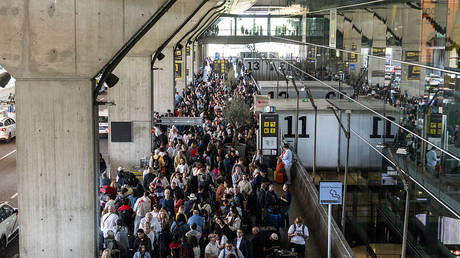 Spain declares state of emergency after nationwide blackout
Spain declares state of emergency after nationwide blackout
Spanish officials have yet to confirm the cause. On Monday evening, Prime Minister Pedro Sanchez said there was no conclusive information.
Power has now been restored across almost all of Spain and Portugal, though both countries remain under states of emergency. On Tuesday morning, REE said electricity had been restored to 99% of Spain. The transport minister warned some trains, including high-speed rail services, would still run on reduced schedules.
Experts say it might take weeks to determine the exact cause of the failure. Some have pointed to Spain’s increasing reliance on renewable energy, particularly solar power, as a potential factor.
Sanchez rejected the claims. “Those linking the blackout to the lack of nuclear power are either lying or demonstrating their ignorance,” he said at a press briefing on Tuesday.
-
Site: AsiaNews.itThe 74-year-old archbishop of Penang was born into an ethnic Indian family. He trained at the historic College of Martyrs whose legacy he feels. He leads a vibrant and multicultural Church with indigenous and migrant communities from different backgrounds. At the synod, he pointed to the horizon of a Church that truly 'walks with the people'.
-
Site: Saint Louis Catholic
Will it be a valid conclave? Who knows? The sure option is to pray for what would only occur with a miracle– a conclave of unquestionably valid Cardinals appointed by the last two popes. Like I said, not bloody likely. Will the conclave actually planned be valid? Maybe. Wait and see. Others have opined in the positive and in the negative. But getting a Pope Burke or Sarah or dare I say Vigano will take miracle upon miracle. All things are possible with God. He wins. He won, He will win. Got it. But such a papacy is humanly unlikely in the extreme.
Have confidence in Christ’s Church, and very little in her current prelates. While I pray and hope, this recent interview of Archbishop Vigano is enough to sober up the most dedicated drunkard.
-
Site: Zero Hedge"Nothing Is Getting Better" - Texas Services Sector Outlook Slumps, Prices SoarTyler Durden Tue, 04/29/2025 - 10:45
Following yesterday's slump in a survey of Texas Manufacturing firms, the Dallas Fed released their survey of Texas Services sector firms today, and it was just a big a shitshow.
Perceptions of broader business conditions deteriorated further in April. The general business activity index dropped eight points to -19.4. In addition, outlooks worsened as the company outlook index retreated to a 34-month low of -15.5. The outlook uncertainty index jumped 13 points to 40.5 - its highest level since mid-2022.
Respondents’ expectations regarding future business activity continued to weaken in April.
Under the hood, we saw further stagflationary signals with revenue forecast plunging as prices soar...
Tariffs were top of mind for many, just as with the Texas Manufacturing survey, as respondents broadly speaking reflected: "Nothing is getting better."
-
[Our concerns are] tariffs, tariffs, tariffs.
-
We have high levels of anxiety as a result of the fast-moving changes in government restructuring and tariff policies. Although we are hoping for the best end results, the overall business environment is very volatile.
-
Our major concern is the effect of tariffs.
-
[We are concerned about] tariff uncertainty and price increases, mostly related to products from China; plus, we are experiencing longer lead times for orders.
-
Potential supply chain impacts of proposed tariffs are being evaluated industrywide.
-
All of the uncertainty is slowing private business.
-
Tariffs are bringing a high level of uncertainty to our business. It is hard to tell what will happen in one week, let alone six months
-
The on-again, off-again psychodrama in Washington with respect to tariffs is upsetting to almost the entirety of the business community. If the unprecedented tariffs continue, the commercial real estate and construction industries will slow to a halt soon.
-
The current tariffs in effect will increase our cost of goods due to increased produce prices and certain imported proteins.
-
The almost daily shifts on tariffs create havoc.
-
People are acting almost in a panic about the economy.
-
Tariffs [are a concern].
-
We are highly concerned about a downturn in activity from a recession caused by the tariffs.
-
[We are] devastated. We are a trucking company specializing in transporting international shipping containers, and there is no other word that captures what we are facing.
-
We are becoming increasingly pessimistic.
-
We are experiencing an unexpected decline in business activity. I see customers becoming more price sensitive and cutting back on general expenditures.
And finally, 'chaos', 'erratic', and 'turmoil' at The White House summed up many people's perspectives:
-
President Donald Trump has a very chaotic style of dealing with the economy.
-
Erratic leadership style in Washington has led to high levels of uncertainty impacting decision making and spending.
-
The insane chaos that is running the White House makes it impossible to plan anything.
-
Daily instability in D.C. continues to create chaos.
-
The randomness of our current president is causing paralysis.
-
Uncertainty in the markets is a killer. Erratic behavior of leadership is even worse.
-
We are devoting so much time to mitigating the chaos this administration is creating that we have little time left to run our business.
Not a pretty picture... and remember, this is Texans.
However, we did find one silver lining comment:
- I'm not too worried about the new tariffs. I think other countries will soon be negotiating with President Trump, and six months from now the national discussion will have moved on.
Is there hope?
"Consumers are on the fence. This will turn eventually."
-
-
Site: RT - News
The Arab-mediated proposal would allow the group to “rearm,” according to officials
Israel has rejected a proposed five-year ceasefire with Hamas, claiming that a long-term truce would allow the Palestinian group to rearm, according to multiple media reports citing Israeli officials.
Egypt and Qatar have tried to mediate a ceasefire in Gaza. Israel broke the previous two-month truce in March by launching a new barrage of attacks on the enclave.
The proposed new deal reportedly included the release of all remaining Israeli hostages held in Gaza in exchange for a long-term cessation of hostilities. Hamas is said to have refused to lay down arms for as long as the Israeli occupation continues.
“There is no chance that we will agree to a hudna with Hamas that just allows it to rearm, recover and to continue its war against Israel,” the official said, as cited by The Times of Israel. “Hudna” is an Arabic term that denotes a prolonged period between a ceasefire and a peace treaty, noted the news outlet.
Read more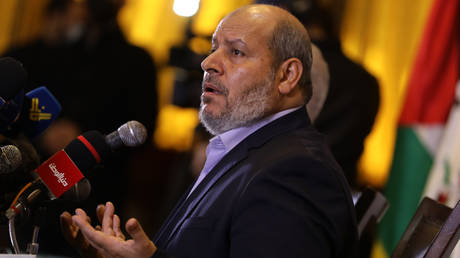 Hamas proposes full hostage release for end of Gaza war
Hamas proposes full hostage release for end of Gaza war
Israel has declared that its primary goal is the total disarmament and elimination of Hamas.
Hamas’ founding charter calls for Israel’s destruction, but the movement has signaled that it might agree to a long-term truce in return for an end to occupation, noted Reuters. Earlier this month, the Palestinian group also said it wanted a comprehensive peace deal and that it would not accept any “partial” agreements.
In response to Israel’s reported refusal to accept the long-term truce, a group representing the families of the hostages stated that “once again the ‘senior political source’ proves that the Israeli government has no plan” for the release of those still in captivity in Gaza.
The Israeli authorities have reported that of the 59 hostages listed as remaining in the enclave, only 24 are thought to have survived. Dozens of others were previously released through ceasefire agreements or separate deals.
Israeli forces have taken control of more than half of Gaza in a renewed offensive following the collapse of a ceasefire and the stalling of hostage negotiations in March. The IDF has resumed air strikes on the enclave in order to increase pressure on Hamas to release the remaining captives.
The ongoing offensive in the enclave was triggered by the October 7 Hamas-led attack on Israel, when the militants killed approximately 1,200 people and took another 250 hostage. Since then, over 51,000 Palestinians have been killed amid the IDF military operation, according to Gazan health authorities.
READ MORE: UN must stand trial – Israel
The humanitarian situation has deteriorated sharply since March due to an Israeli-imposed blockade, leading to severe shortages of food, medical supplies, and other essential resources.
-
Site: Zero HedgeGM Pulls Guidance And Pauses Buybacks Amidst "Tariff Uncertainty"Tyler Durden Tue, 04/29/2025 - 10:30
GM stock dipped slightly Tuesday morning after the company pulled its annual profit forecast, citing significant uncertainty created by President Trump's evolving trade policies, according to Bloomberg, WSJ and multiple other outlets.
Despite reporting strong first-quarter results, the Detroit automaker warned investors not to rely on previous guidance due to the potentially "significant" impact of automotive tariffs.
"We're telling folks not to rely on the prior guidance, and we'll update when we have more information around tariffs," GM Chief Financial Officer Paul Jacobson said during a media call. "Given the evolving nature of the situation, we believe the future impact of tariffs could be significant."
The company's decision comes as the White House reportedly moves to soften the impact of auto tariffs, preventing them from stacking atop existing duties like those on steel and aluminum. According to The Wall Street Journal, the administration will allow automakers to be reimbursed for overlapping tariffs, a change expected to be retroactive and officially announced before Trump's rally in Michigan Tuesday evening.
Commerce Secretary Howard Lutnick confirmed a deal had been struck, though details remained scarce. The adjustments could offer temporary relief to domestic automakers, including GM, which assemble cars in the U.S. but rely on imported parts.
Nevertheless, GM’s leadership is urging caution. "We're going to look for more clarity before we get into any forward projections of the tariff exposure," Jacobson said.
In January, GM had forecast net income between $11.2 billion and $12.5 billion for 2025, excluding tariff impacts. It also projected adjusted pretax profit between $13.7 billion and $15.7 billion. That forecast is now shelved.
First-quarter results showed cracks forming. GM’s net income fell 6.6% to $2.8 billion, dragged down by weaker sales of highly profitable trucks and SUVs, along with rising warranty and labor costs. Adjusted earnings before interest and taxes (EBIT) slipped 9.8% to $3.49 billion, with EBIT-adjusted margins falling from 9% a year ago to 7.9%.
Revenue, however, rose 2.3% to $44 billion, surpassing analysts’ estimates of $43 billion. Adjusted earnings per share came in at $2.78, also ahead of expectations. GM credited a last-minute surge in car buying in March, as consumers sought to beat potential price hikes from new tariffs that began earlier this month.
While the results slightly exceeded Wall Street's cautious predictions, they revealed growing challenges for a company that has ridden high profits in recent years. Jacobson pointed to an "unusually strong" first quarter in 2024 following the resolution of a United Auto Workers strike, suggesting 2025’s first quarter suffered by comparison.
Earlier this month, GM reported U.S. sales jumped 17% year-over-year to 693,363 units, led by strength in trucks and EVs across its Chevrolet, Cadillac, Buick, and GMC brands. Full-size pickups, particularly the Chevrolet Silverado and GMC Sierra, delivered their best first-quarter sales since 2007.
Nonetheless, GM is bracing for a turbulent year ahead. The company delayed its analysts' call until Thursday, an unusual step reflecting the fast-changing policy environment.
Chair and CEO Mary Barra, in a statement, said, "We appreciate the productive conversations with the President and his Administration and look forward to continuing to work together."
In the meantime, GM announced it would pause new share buybacks beyond the $2 billion plan slated for completion in the second quarter, pending greater economic clarity. It stressed there was no current need to raise additional capital.
-
Site: Zero Hedge"Never A Consideration" - Amazon Denies Media Claims Of 'Tariff-Tracker'Tyler Durden Tue, 04/29/2025 - 10:25
Update (1155ET): According to CNN (so who knows) - a senior Trump admin official told President Trump about the story, after which Trump called Amazon founder Jeff Bezos following the Punchbowl report that Amazon was considering displaying the cost of US tariffs next to prices on its website. Shortly after the call, an Amazon spokesman released a statement 'clarifying' that the move wasn't considered for the main Amazon site - rather, just 'Amazon Haul.'
"This was never approved and not going to happen," said the spokesperson.
Earlier...
Well that didn't take long...
Amazon has just issued a statement denying PunchBowl's reporting and explaining that showing tariffs costs on the main Amazon site was "never a consideration":
“The team that runs our ultra low cost Amazon Haul store has considered listing import charges on certain products.
This was never a consideration for the main Amazon site and nothing has been implemented on any Amazon properties.”
Amazon's share price is rebounding on the statement...
Of course, by NOT exposing these numbers (which the leftists and legacy media were cheering so loudly), Jeff Bezos has just shifted the crosshairs once again:
Bezos is once again the second most hated billionaire by the left
— zerohedge (@zerohedge) April 29, 2025So did PunchBowl just make this up?
Punchbowl story on Amazon, sponsored by Amazon, isn't completely true, per Amazon. pic.twitter.com/5JD7nCk5Pa
— Alex Kantrowitz (@Kantrowitz) April 29, 2025* * *
Shares of Amazon tumbled to premarket lows Tuesday after White House Press Secretary Karoline Leavitt called the company's recent decision to display the effect of tariffs on products a "hostile and political act," adding "why didn't Amazon do this when the Biden administration hiked inflation to the highest level in 40 years?"
"It's not a surprise," Leavitt continued, adding "Amazon has partnered with a Chinese propaganda arm. So this is another reason Americans should buy American."
Watch:
White House calls Amazon's decision to cite Trump tariffs cost on products a "hostile and political act."
— Josh Caplan (@joshdcaplan) April 29, 2025
"Why didn't Amazon do this when the Biden administration hiked inflation to the highest level in 40 years?" pic.twitter.com/fdof5noJp4AMZN shares are trading over 2% lower in the pre-market following the remarks.
The e-commerce giant will soon display how much of an item's cost is derived from tariffs - 'right next to the product's total listed price,' Punchbowl News reported earlier Tuesday.
Of note, companies like Amazon and Shein Group Ltd. are bracing for a 120% tariff on many of their products due to the US government's decision to end the "de minimis" exemption which allowed goods valued at under $800 to pass into the US without tariffs or customs duties.
Why does Amazon refuse to disclose where its crap products from companies with fake names are manufactured. Amazon won’t disclose country of origin, but it knows the exact country-specific tariff? https://t.co/KU7gr6ILMe
— Sean Davis (@seanmdav) April 29, 2025According to Treasury Secretary Scott Bessent, who attended the press briefing, Amazon's move to highlight tariffs is unfair given that the costs of policies implemented by other administrations (including regulations) aren't being broken out by Amazon.
"The big tax on consumers that goes unnoticed is deregulation or regulation, and we are deregulating and bringing that down," Bessent said. "So you know, from a household income point of view, we would expect real purchasing increases that we’ve seen over the first 100 days, and we would expect that to accelerate."
Needless to say, this "hostile and political" move by Amazon is catching heat...
Executive order mandating that on-line sales identify country of origin for each product.
— Carnot's Law (@Len54Len) April 29, 2025Absolutely right. Amazon’s decision is clearly political. They didn't flag inflation impacts under Biden, but now single out tariffs under Trump.
— VJT (@KelvinCold1234) April 29, 2025 -
Site: Zero HedgeConference Board Consumer Expectations Plunge To 14 Year Lows; Inflation Expectations SoarTyler Durden Tue, 04/29/2025 - 10:14
Another day, another sentiment measure disappoints...
US consumer confidence fell in April to an almost five-year low on growing pessimism about prospects for the economy and labor market due to tariffs. The Conference Board’s gauge of confidence decreased nearly 8 points to 86, the weakest since May 2020. This was the fifth straight monthly decline, the longest such stretch since 2008.
Worse still, consumer expectations for the next six months plunged to the lowest level since 2011, while a gauge of present conditions also fell.
“Consumer confidence declined for a fifth consecutive month in April, falling to levels not seen since the onset of the COVID pandemic,” said Stephanie Guichard, Senior Economist, Global Indicators at The Conference Board.
“The decline was largely driven by consumers’ expectations. The three expectation components—business conditions, employment prospects, and future income—all deteriorated sharply, reflecting pervasive pessimism about the future.
Notably, the share of consumers expecting fewer jobs in the next six months (32.1%) was nearly as high as in April 2009, in the middle of the Great Recession. In addition, expectations about future income prospects turned clearly negative for the first time in five years, suggesting that concerns about the economy have now spread to consumers worrying about their own personal situations.
However, consumers’ views of the present have held up, containing the overall decline in the Index.”
Labor market conditions weakened, extending their very recent downtrend...
High financial market volatility in April pushed consumers’ views about the stock market deeper into negative territory, with 48.5% expecting stock prices to decline over the next 12 months (the highest share since October 2011).
Meanwhile, average 12-month inflation expectations reached 7% in April - the highest since November 2022, when the US was experiencing extremely high inflation.
Notably, the NYFed's measure of inflation expectations (and the market's measure of inflation expectations) are NOT screaming higher like UMICH and CONF BOARD surveys...
Finally, we note that April’s fall in confidence was broad-based across all age groups and most income groups. The decline was sharpest among consumers between 35 and 55 years old, and consumers in households earning more than $125,000 a year.
Guichard added that write-in responses on what topics are affecting views of the economy revealed that tariffs are now on top of consumers’ minds, with mentions of tariffs reaching an all-time high.
Consumers explicitly mentioned concerns about tariffs increasing prices and having negative impacts on the economy.
Inflation and high prices remained important for consumers’ views about the economy: while the majority complained about the high cost of living, there were also some references to declines in the prices of gas and some food items.
The decline in confidence was shared across all political affiliations.
-
Site: RT - News
Gideon Saar has lashed out at the global body, as the International Court of Justice begins hearings over Gaza
Israeli Foreign Minister Gideon Saar has demanded that the United Nations and its refugee agency UNRWA face trial at the International Court of Justice (ICJ) instead of Israel.
The UN top court began hearings on Monday on West Jerusalem’s role in the humanitarian crisis in Gaza.
The ICJ hearings aim to examine whether Israel’s ban on UNRWA, the agency that provides food, education and medical care to the residents of Gaza, violates international law, including the UN Charter.
Speaking at a news conference, Saar accused the UN of “double standards” and claimed that Israel had been subjected to “systematic persecution and delegitimization” by the international body.
“I accuse UNRWA, I accuse the UN, I accuse the secretary general, and I accuse all those that weaponized international law” of depriving his country of “its most basic right to defend itself,” Saar said, stating that it’s “the UN and UNRWA that should be on trial today, not Israel.”
Read more ICC responds to appeal of Netanyahu arrest warrant
ICC responds to appeal of Netanyahu arrest warrant
The foreign minister went on to slam the New York-based institution as “a rotten, anti-Israel and antisemitic body.”
The Israeli government has refused to take part in the hearings, which are scheduled to run for a week and will hear evidence from 40 states and four international organizations.
A Palestinian representative told the court on Monday that Israel was killing and displacing civilians and targeting aid workers in Gaza. On Tuesday, a South African representative claimed that the “Palestinians are being subjected to atrocity, crimes, persecution, apartheid and genocide.”
Israel designated UNRWA a “terrorist organization” and cut ties with the agency in November. It has also claimed many of its workers have engaged in terrorism in recent years, including taking part in the October 7 deadly attack by Hamas on southern Israel, which triggered the offensive into Gaza.
While the UN has confirmed some individual cases and dismissed nine workers suspected of links to Hamas, it has rejected Israel’s broader allegations.
The conflict in the enclave has resulted in over 51,000 Palestinian deaths, according to the Gaza Health Ministry. Most are reported to be civilians, including a significant number of women and children.
READ MORE: How Israel hunts and executes Palestinian medics
The humanitarian situation has deteriorated sharply due to an Israeli-imposed blockade, leading to severe shortages of food, medical supplies, and other essential resources. International organizations have expressed grave concern over the crisis and its impact on the civilian population.
-
Site: Steyn OnlineProgramming note: Tomorrow, Wednesday, at 3pm North American Eastern (8pm British Summer Time), I hope to be here for our regular midweek Clubland Q&A, taking questions from Mark Steyn Club listeners around the world. Hope you can swing by. ~So in the
-
Site: Zero HedgePutin Thanks Kim For 'Heroic' North Korean Troops That Helped Liberate KurskTyler Durden Tue, 04/29/2025 - 09:55
For the first time the governments of Russia and North Korea have issued coordinated statements of high-level confirmation that North Korean troops were sent to fight for Russia against Ukraine, having been deployed months ago.
The statements described that the large foreign troop contingency helped liberate Russia's Kursk border region, after a Ukrainian incursion and occupation which stretched all the way back to last August.
Putin said Monday that the population would never forget the 'heroic' feats of North Korea’s special forces. "We will always honor the Korean heroes who gave their lives for Russia, for our common freedom, on par with their Russian brothers in arms."
He further declared they had helped defeat the "neo-Nazi formations" sent by Ukraine and that this was based on "solidarity" and "genuine comradery"
Putin finally confirms North Korean troops have been fighting against Ukraine, pursuant to the mutual defense provision of the June 2024 treaty signed by Russia and North Korea. At the time, it was ambiguous how robust that treaty was to believed to be. Turns out, quite robust pic.twitter.com/PbxjRrkVeL
— Michael Tracey (@mtracey) April 28, 2025It was only days ago that Putin officially declared the full liberation of Kursk had been accomplished, after the Ukrainians were pushed out of the final border village of Gornal.
Along with huge amounts of artillery shells and likely even ballistic missiles, North Korea has sent "14,000 troops, mostly members of its special operations units, to Russia, including 3,000 dispatched earlier this year to replace those killed or wounded, according to South Korean officials," the NY Times writes.
All of this was based on a mutual defense treaty inked in Pyongyang last summer. While details have been somewhat scant, it has become clear that the treaty is "quite robust" - as journalist Michael Tracey has pointed out.
As for North Korea's Kim Jong Un, KCNA quoted him Monday as saying, "They who fought for justice are all heroes and representatives of the honor of the motherland."
North Korea "regards it as an honor to have an alliance with such a powerful state as the Russian Federation," he added. Ukraine has claimed to have captured both North Korean and even Chinese troops.
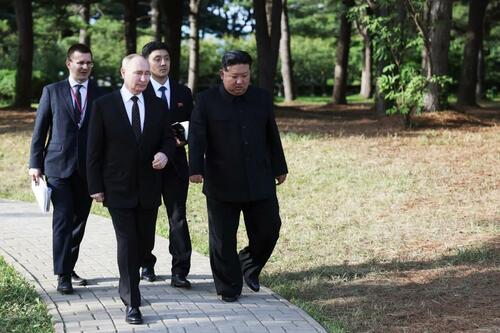 Via Sputnik
Via Sputnik
As for Kursk, at the height of the cross-border offensive Ukraine's military had seized just over 530 square miles, but regional reports indicated a week ago that significant figure was down to less than just 20 square miles - and then came the final assault to liberate Gornal.
Prior South Korean intelligence reports have claimed the North Koreans lost over 1,000 casualties in Kursk. But nothing official on this has ever been issued from any side.
-
Site: AsiaNews.itThe upcoming vote will be the sixth since the fall of Saddam Hussein. This will occur against a background of intra-Shia divisions while incumbent Prime Minister al-Sudani is looking for a strong coalition to win a second term. The election appears competitive in Kurdistan, with opposition parties trying to break the KDP-PUK stranglehold. The Christian vote remains an unknown factor while doubts linger over representativeness.
-
Site: Zero HedgeHave You Built Your "Grid" Correctly?Tyler Durden Tue, 04/29/2025 - 09:35
By Michael Every of Rabobank
Delusions of Homo Economicus aside, we each see the world differently via the unconscious cognitive ‘grid’ we all impose on it. Yet in highly unstable times, one needs to check if one’s grid is stable enough to cope.
A week after boasting it had achieved 100% renewables energy power for the first time, Spain’s power grid suffered a crippling blackout, along with Portugal’s. Apparently, this was due to over-reliance on what are always fluctuating power sources vs. the base power that comes from fossil fuels, nuclear, or storage batteries.
Total chaos and a state of emergency ensued: those without cash couldn’t operate – most businesses didn’t; neither did trains, planes, or traffic lights. A never-before tried renewables-based grid black start had restored 3/4 of power at time of writing. The lessons from this shock are: 1) this is what a cyberattack on the West could look like – and we aren’t ready; and 2) as global energy expert @aberman12 makes clear, we can’t rely on renewables power without back-up batteries. Further massive investment is needed; or a return to fossil fuels or nuclear; or we run the risk of black outs from time to time.
Talking of shocks and massive investments, the US says it’s close to giving up on its peace deal for Ukraine: Europe is worried it’s going to walk away, leaving it to carry the defense can. Note recent rumors the UK is unwilling to send troops to Ukraine on concerns that it could lead to direct UK-Russia clashes. The same obviously applies for Europe.
Therefore, the EU and UK will tomorrow announce a strategic partnership aimed at “maintaining global economic stability and our mutual commitment to free and open trade,” along with security cooperation – though whether that means either side will risk a Russia clash absent US cover remains to be seen. Moreover, that’s ahead of a by-election and local elections this week where the Labor government was already going to get hit hard by the anti-EU/pro-US Reform Party – the size of that blow may increase in proportion to the commitment to that new UK-EU deal. Furthermore, how is that new partnership compatible with the UK --who are trying-- and Europe --who reportedly aren’t-- striking a US trade deal? Do they come as a package now, or not at all?
Equally, the UK is reportedly also close to an FTA with India; yet India is close to a deal with the US that isn’t going to be for “free and open” trade with China. Likewise, Canada’s election --where Trump had called for people to vote for the candidate who would make it the 51st state-- looks like seeing acting PM Carney as the one who will have to accept the “No more China” trade terms that Trump will impose, regardless of what he said pre-election.
Expand, or contract, your mental grid to see that “Free trade first” fluctuations aren’t compatible with baseload “security first” realpolitik.
As an example, Pakistan just warned of imminent India military action against it in response to a recent terror attack in Kashmir, to which China stated: “As Pakistan's ironclad friend and all-weather strategic cooperative partner, China fully understands Pakistan's legitimate security concerns and supports Pakistan in safeguarding its sovereignty and security interests,” with rumours it and Turkey are sending Pakistan weapons.
India will surely be looking for mirroring statements and actions from those who want more trade with it. The UK and the EU aren’t going to provide them; BRICS is a joke given what C just said about I, via P; and that only leaves the US.
Indeed, the White House is still expecting to bolt on its first new trade deal soon, as noted, likely with India, which could start a domino effect given the scale and potential of those two economies in tandem. At least that’s the plan.
The US will reportedly soften auto tariffs so they don’t stack with steel and aluminium ones, and those on auto parts will be eased. However, it says it’s up to China to de-escalate for a trade deal - which is by necessity and realpolitik more than a trade deal. That’s a message being sent and received on many levels for those who know how to look for the signs aside from those officially recognised by Bloomberg and the Financial Times.
Yet as reports flood in of US supply chains trying to move out of China, Beijing is allegedly blocking other countries’ attempts to buy China-made intermediate goods, and engineering talent, to ensure production of downstream goods stays at home. “Rules-based order”, right?
Meanwhile, a Fed Dallas survey saw firms terrified about looming supply-chain shocks and already asking for rate cuts. They won’t help much, much as markets can’t understand that, again, but that’s what they are asking for if they can’t get tariff relief.
US Senator Paul is quoted by CNN as saying he has the votes to block Trump's tariffs in the Senate, but the move could be blocked by Speaker Johnson in the House, speaking to the political pressures building, even as there is no election for over 18 months and the prospect of consumer tax cuts ahead: Trump just floated removing income tax on anyone earning less than $200,000.
Of course, that will threaten to blow the US deficit sky high, Liz Truss style: buckle-up, buckaroos. Unless supply shocks are deflationary due to a slump in demand and yields fall: buckle-up, buckaroos.
Again, expand your grid and understand this isn’t just about tariffs, and tariffs aren’t just about trade, and trade isn’t the real game either.
To cap the morning off, the founder of Binance says he thinks the creator of Bitcoin was an AI from the future. Really.
Expand your grid immediately - or risk blackouts.
-
Site: Ron Paul Institute - Featured Articles
In what can only be called one of the most ridiculous federal criminal prosecutions in U.S. history, the U.S. Department of Justice and, specifically, the U.S. Attorney’s Office in the Middle District of Florida, ended up with a massive amount of egg on its face. The case involved the criminal prosecution of Black rights activists affiliated with the African People’s Socialist Party and the Uhuru Movement, including the 82-year-old chairman of the Party, Omali Yeshitela, and some White allies, including a 78-year-old woman named Penny Hess.
The feds accused the defendants of serving as Russian agents. Needless to say, the prosecution reflected the deep anti-Russia paranoia that has come to characterize the federal government, especially the Justice Department. This federal mindset is simply an outgrowth of the old Cold War mentality in which federal officials were convinced that the Russians were coming to get us — along with the Cubans, North Koreans, Chinese, North Vietnamese, and other Reds. The “modern” anti-Russia mindset is that the Russians are influencing millions of presumably feeble-minded public-schooled American voters who will easily fall for Russian propaganda if not protected by their federal overlords.
What was the real crime that the defendants had committed? They have long criticized the militarism and foreign interventionism of the U.S. Empire, just as Martin Luther King, Malcolm X, Mohammad Ali, and other Blacks have done for decades. The criticism is bad enough from the standpoint of “patriotism,” but the fact that such criticism comes from Blacks obviously makes it significantly worse. The fact that the criticisms matched criticisms of the Russian government sealed the fate of the accused. In the minds of federal officials, it had to be — it just had to be — that the defendants were serving as unregistered agents of the Russian government. As such, they had to be punished severely and, it was hoped, be put away in a federal penitentiary for many years, which would not only silence them but also send a message to other Black activists to shut up and become loyal supporters of the U.S. Empire.
The technical charges against the defendants that ended up going to the jury were (1) failing to register with the U.S. government as Russian agents; and (2) conspiracy to fail to register as Russian agents.
In his opening statement at trial, a federal prosecutor told the jury that the defendants had opposed U.S. genocide of Blacks here in the United States as well as U.S. policy in Ukraine by siding with Russia rather than Ukraine. The prosecutor stated that “the defendants acted at the direction of the Russian government to sow division right here in the U.S.” Imagine — such horrific offenses!
The prosecutors were hoping to send the defendants away for 15 years, which, of course, would have been a life sentence for Yeshitela and Hess. The prosecutors were also aiming to hit the defendants with a massive fine in the hopes of bankrupting them.
Alas, things did not work out well for the feds in this criminal prosecution — and rightly so. They ended up having to wipe lots of egg from their faces. The jury returned with a not guilty verdict on the failure to register charge and a guilty verdict on the conspiracy charge, which is obviously a nonsensical verdict.
But let’s first note the ludicrous nature of both of these charges in what is purportedly a free country. In a free country, a person has the right to work for any foreign government he wants. Oh, yes, I know that Russia is considered to be an “official enemy” or “rival” or “opponent” or “competitor” of the U.S. Empire. But that’s just an imperialist construct. The fact is that in a genuinely free society, people have the right to work for whomever they want.
People also have the right to oppose any policy of their government, including opposing the massive death toll and the mass incarceration of Blacks in the U.S. war on drugs and also opposing the U.S. Empire’s foreign policy of invasions, occupations, wars of aggression, state-sponsored assassinations, torture, indefinite detention, renditions to foreign regimes, coups, and provoking wars between other countries.
In fact, in the United States, it is perfectly legal to work for the Russian government or any other government. So, what’s the problem? The problem is that the U.S. government has enacted a law that requires people who work for foreign governments to register their names with the feds. So, one is free to work for the Russian government, but if one does so, he has to put his name on an official list of the U.S. government.
That is ludicrous. Why should anyone have to register with the federal government for any reason, including working for a foreign government? Where in the Constitution does it give the federal government the power to enact such a law? How can such a registration requirement be reconciled with the principles of a free society? It can’t be. In a genuinely free society, people have the right not only to work for foreign governments but also the freedom not to register their names with the federal government. It’s probably worth mentioning that Russia also has the same type of registration requirement.
In any event, much to the Justice Department’s chagrin, the jury acquitted the defendants of failing to register as Russian agents. That could only mean one thing — that the jury concluded that they weren’t working as agents for the Russian government.
Yet, the jury then convicted them of conspiring to fail to register as federal agents, which makes the case even more ludicrous. The jury verdict essentially said that while the defendants had not served as agents of the Russian government, they had entered into an agreement to not register as agents of the Russian government. The verdict only goes to show the nonsensical nature of the law of conspiracy.
In any event, the feds were still hoping that the judge would sentence the defendants to serve several years in a federal prison on the conspiracy conviction. It didn’t happen. Pointing out that the case revolved largely around the defendants’ exercise of free speech, the judge gave the defendants probation and 300 hours of community service.
While the mild sentence was clearly a rebuke of the federal prosecutors, what the judge should have done instead is throw out the conviction entirely. To their credit, the defendants are appealing their conviction notwithstanding the judge’s light sentence. Hopefully, the Court of Appeals will throw more egg on the faces of the federal prosecutors and throw out this ludicrous Russia-paranoia-based criminal conviction.
Reprinted with permission from Future of Freedom Foundation.
-
Site: Zero HedgeUS Home Prices Hit A New Record High In February... Except In TampaTyler Durden Tue, 04/29/2025 - 09:14
US home prices hit a new record high in February, according to the latest data from S&P CoreLogic Case-Shiller, rising 0.4% MoM (as expected). However, the pace of price rises did slow modestly (after accelerating for the past three months) to +4.50% YoY...
But as the average national home price rose to yet another record high, prices in Tampa continued to fall...
But Las Vegas and San Diego are also seeing prices start to decelerate rapidly...
Arguably, (lagged) mortgage rates dipped during that period (positive short-term for the highly smoothed and lagged Case Shiller series), but as is clear, the next couple of months do not bode well...
However, home price appreciation does seem to track very closely with bank reserves at The Fed (6mo lag), which implies prices are going continue to lag for the next couple of months before re-accelerating once again...
So 100bps of rate-cuts prompted a re-acceleration in home prices...Well played Fed!!
-
Site: RT - News
The West has mocked Beijing’s military for decades – it may soon regret it
The internet is flooded with quotes attributed to Chinese philosophers. Who hasn’t seen a meme with a “Confucius” saying or heard of the so-called “ancient Chinese curse” about living in interesting times? In reality, 99% of these quotations are fake, reflecting Western projections of Chinese wisdom rather than its reality. Yet one saying – “good iron does not make nails; good men do not make soldiers” – is genuinely Chinese. Known since at least the Song Dynasty (late 10th – early 12th century), it remains in use today, much to the irritation of China’s People’s Liberation Army (PLA) political officers.
Globally, the proverb helped fuel a myth that China “never liked to fight” and “always lost wars.” Yet the absurdity of this view is clear if one simply looks at the world map today. Nevertheless, it persists – and now, as China becomes a true superpower, this misconception could have dangerous consequences for the world.
Historical roots
To understand the proverb’s origin, we must look at the structure of the Song Dynasty's military. Early Chinese empires such as the Han relied on conscription, but over time, mercenary armies became the norm. Chronic shortages of volunteers were addressed by drafting criminals and debtors – turning armies into collections of society’s “undesirables.”
Officers, by contrast, came from privileged classes who passed imperial military exams. These exams, though less prestigious than their civilian counterparts, still conferred status. But it is crucial to remember that the civil bureaucracy was tiny, making its officials extraordinarily powerful, while rank-and-file soldiers remained socially degraded.
Read more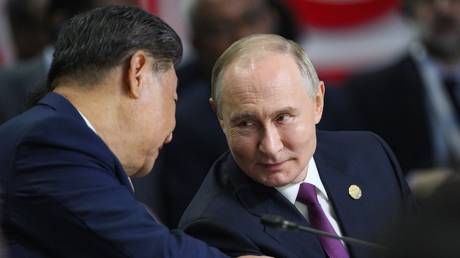 The West is breaking up – here is what Russia and China must do
The West is breaking up – here is what Russia and China must do
This pattern closely resembled Europe in the 17th and 18th centuries: a privileged officer corps and low-status, often criminal, enlisted men. Wellington’s remark in 1811 that “only men of the worst character enter the regular service” could have been said about China too. Military service was a punishment; soldiers were feared more for their misbehavior than admired for their valor. In that context, the “men and nails” proverb made perfect sense – and was hardly unique to China.
The modern Western glorification of the soldier – tied to mass conscription, nationalism, and industrial militarism – only emerged in the 19th century. In China, where social and political backwardness lingered longer, this transformation began only in the 20th century with enormous difficulty.
China’s true military record
A regular, centrally commanded, professionally trained army – the PLA – was only created in the 1950s, after the Communist victory. Almost immediately, the PLA demonstrated its effectiveness by intervening in the Korean War, inflicting a series of defeats on UN forces and saving North Korea. The Soviet Union, by contrast, limited itself to sending small air and anti-aircraft units.
In 1962, China launched a well-timed, surprise offensive against India, achieving a quick victory and territorial gains. Beijing struck while the world was distracted by the Cuban Missile Crisis. Throughout the 1960s, China also provided major military support to North Vietnam, at times deploying up to 170,000 troops – considerably more than the Soviet Union ever committed.
In 1969, Beijing provoked and fought small border clashes with the USSR – a calculated show of strength aimed at achieving key foreign and domestic policy goals, including paving the way for rapprochement with the United States. The military component was minor; the political impact was enormous.
Meanwhile, the PLA fought a prolonged counterinsurgency campaign in Tibet, defeating US- and Indian-backed guerrillas by the early 1970s. It also engaged in recurring military action against Taiwan, demonstrating clear superiority across the Taiwan Strait.
Read more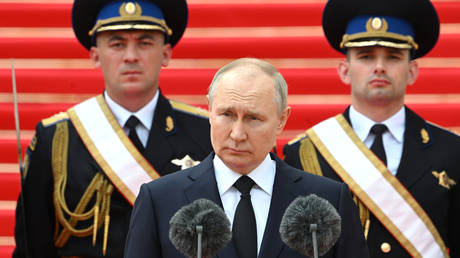 Fyodor Lukyanov: Forget land – this is Russia’s main demand from the West
Fyodor Lukyanov: Forget land – this is Russia’s main demand from the West
Risk-taking and adaptation
In February 1979, China launched an invasion of Vietnam, a newly minted Soviet ally. This bold action risked conflict with a nuclear superpower. The campaign exposed PLA shortcomings but also demonstrated its resilience, willingness to absorb heavy casualties, and ability to carry out major offensives.
While Vietnam held out thanks to Soviet military threats against China, Beijing’s ability to act – and to compel both Moscow and Washington to recalibrate their policies – was a major achievement.
The Sino-Vietnamese conflict evolved into a decade-long border war marked by artillery duels, naval clashes, and raids, culminating in China’s decisive naval victory in the Spratly Islands in 1988.
Comparing China’s record from 1949-1989 to the Soviet Union’s reveals a striking fact: China used military force more frequently, and arguably more effectively, than the USSR during the Cold War.
Modernization and patience
After Mao’s death, the PLA underwent profound modernization, both politically and socially. Military service gained prestige. During the Cultural Revolution, the army became a pillar of governance and society. Yet, China’s foreign policy turned defensive from the 1990s onward – not from weakness, but from strategic calculation.
After the Soviet collapse, China faced a unipolar world dominated by the United States. Survival and development required patience. Beijing avoided major military engagements for nearly 30 years, instead focusing on economic and technological breakthroughs. Shows of force were reserved for defending “core interests,” such as during the 1995-1996 Taiwan Strait Crisis.
Read more Challenging anarchy: Russian roulette in post-Assad Syria
Challenging anarchy: Russian roulette in post-Assad Syria
By the late 2010s, the global environment had changed. American dominance weakened. The unipolar order eroded. China’s rise, both economic and military, became undeniable.
Beijing’s gradual reassertion of military power has been cautious but unmistakable: expanding operational reach, forging military partnerships, and conducting exercises in potential conflict zones.
A dangerous myth
The myth of Chinese military incompetence is not only historically false; it is potentially catastrophic. In the past, underestimating China’s capabilities led adversaries to miscalculate – to their great cost. Today, as China carefully prepares for its first major combat operations in decades, its adversaries would do well to shed illusions and study history more carefully.
Beijing will not rush into war. It will act only under conditions it judges favorable and under circumstances it has painstakingly prepared. But make no mistake: when it acts, China will not be the passive, incompetent power that outdated stereotypes imagine.
This article was first published by the magazine Profile and was translated and edited by the RT team.
-
Site: LifeNews
President Donald Trump has moved swiftly to advance a pro-life agenda in the first 100 days of his second term, enacting a series of executive actions and policy changes that have energized pro-life advocates.
Since his inauguration on January 20, Trump has signed more than 139 executive orders, with several directly targeting pro-life policies and reinforcing protections for the sanctity of human life.
These actions fulfill key campaign promises and align with the priorities of pro-life groups, who see the administration’s early moves as a historic step toward curbing abortion and promoting a culture of life.
Trump started on advancing the pro-life agenda during his first week in office with removing Joe Biden’s web site that promoted abortion. He followed that up with an executive order that confirmed human beings begin their lives at conception.
The president followed that up with an executive order pardoning 23 pro-life Americans who Joe Bien unjustly convicted for exercising their free speech rights to protest at abortion businesses.
Trump signed an executive order reinstating the “Mexico City Policy,” which prohibits taxpayer funding of groups like International Planned Parenthood that promote and perform abortions in other nations.
HELP LIFENEWS SAVE BABIES FROM ABORTION! Please help LifeNews.com with a donation!
President Trump issued an executive order enforcing the Hyde Amendment, which bars the use of federal funds for elective abortions domestically. This move underscores the administration’s commitment to preventing taxpayer dollars from funding abortion services within the United States.
That order drew praise from pro-life groups.
“U.S. taxpayers should not be paying for abortions,” said Carol Tobias, president of National Right to Life. “We are grateful that President Trump is committed to preventing taxpayer dollars from being used to pay for the deaths of preborn babies.”
Tobias continued, “Reestablishing the U.S. commitment to protecting life on the international stage restores our role as leaders on this issue. Women in disadvantaged countries want clean water, better health care, a good education, and safety for their kids. Thanks to President Trump, the U.S. response is not going to push to kill their children instead.”
President Trump also participated in the annual March for Life rally in Washington, D.C., where he delivered a videotaped speech reaffirming his administration’s dedication to pro-life initiatives. His presence at the rally reminded pro-life Americans of a significant moment during his first term, as he became the first sitting president to attend the event in person, signaling strong support for the anti-abortion movement. The event also saw JD Vance give his first speech as the Vice President.
Furthermore, the administration announced plans to limit the enforcement of the Freedom of Access to Clinic Entrances (FACE) Act, arguing that it has been used to target pro-life activists unfairly. This decision reflects the administration’s stance on protecting the rights of individuals engaging in peaceful protest outside abortion businesses. The end of lawfare against pro-life Americans is a significant free speech victory.
President Trump also issued a statement endorsing a Congressional bill that would protect babies who survive abortions. And finally, President Trump signed the United States onto a document called the Geneva Declaration that confirms there is no right to kill babies in abortions.
In other pro-life actions, Trump has dropped a lawsuit Joe Biden filed attempting to force Idaho to allow abortions. He froze some Planned Parenthood funding, cutting of $27.5 million to the abortion giant and he defunded UNFPA, which promoted forced abortions in China. Trump also nominated the head of a pro-life group as Vatican ambassador.
Collectively, these actions and others during President Trump’s first 100 days in office highlight a concerted effort to implement pro-life policies both domestically and internationally. By reinstating and enforcing policies that restrict federal funding for abortion services and participating in pro-life events, the administration has demonstrated its commitment to advancing the pro-life agenda.

The post President Trump Compiles Solid Pro-Life Record During First 100 Days in Office appeared first on LifeNews.com.
-
Site: Zero HedgeHim & Hers, Novo Nordisk Partner To Sell Heavily Discounted WegovyTyler Durden Tue, 04/29/2025 - 09:05
Novo Nordisk is teaming up with major telehealth companies to sell its blockbuster weight-loss drug Wegovy directly to U.S. consumers at a steep discount through its new direct-to-consumer pharmacy platform. For many, the monthly cost of Wegovy will now be more affordable than the average monthly payment for a new vehicle.
Bloomberg reported that NovoCare will begin offering Wegovy through telehealth firms Hims & Hers Health, LifeMD, and Ro. The weight-loss drug will be offered as subscription models on Hims and Ro. Hims will sell Wegovy for $599 monthly, including a membership offering clinical and nutritional support. Ro will charge $499 monthly for Wegovy, plus a $145 membership fee after the first month. Both of these monthly prices are being offered at more than 50% of the drug's retail price in the U.S. market.
"The strategy comes as rival Eli Lilly & Co. has teamed up with telehealth firms like Ro to distribute lower-cost vials of its own obesity medication, Zepbound. Lilly doesn't have a similar partnership with Hims, which sells Zepbound independently at a premium compared to Lilly's discounted offering," Bloomberg noted.
We noted in early March that Novo was preparing for a direct-to-consumer launch to take on Lilly's Zepbound.
Andrew Dudum, CEO and founder of Hims, said Novo's new partnership is "delivering the future of healthcare" by offering Americans affordable, breakthrough medicine that improves long-term health outcomes.
"Beyond this initial collaboration, the companies are developing a roadmap that combines Novo Nordisk's innovative medications with Hims' ability to deliver access to quality care at scale, with the goal of improving long-term outcomes for more people living with chronic disease, and doing that more affordably," said Dave Moore, Novo's executive vice president for U.S. operations.
Last year, elevated demand for Wegovy and Zepbound led telehealth companies — including Hims and Ro — to sell compounded versions of these wonder drugs at steep discounts.
Moore told Bloomberg that more affordable pricing and increased partnerships are a "change" for Wegovy and that "this is different than where we have been in the last couple of years."
In markets, shares of Hims in New York surged as much as 30% in premarket trading. On the year, shares are up nearly 18% as of Monday's close.
The short interest in Hims recently touched 34.33% of the float, or about 61 million shares short.
-
Site: Catholic Herald
ROME – After initially insisting he would take part in the conclave to elect a successor to Pope Francis, Italian Cardinal Angelo Becciu, stripped of his privileges as a cardinal by the late pontiff in 2020 and convicted of financial fraud by a Vatican court in 2023, has withdrawn after reportedly being shown documents signed by the pope confirming it was his will Becciu not participate.
“Having at heart the good of the church, which I’ve served and will continue to serve with fidelity and love, as well as to contribute to the communion and serenity of the conclave, I’ve decided to obey as I always have the will of Pope Francis to not enter into the conclave, despite remaining convinced of my innocence,” the 76-year-old Becciu said in a statement.
That marks a change of tune for Becciu, who initially insisted he would file into the Sistine Chapel along with other cardinal electors on the grounds that Pope Francis never explicitly told him he couldn’t, and moreover, that a personal invitation from Francis to participate in a consistory in 2022 for the elevation of new cardinals signified a desire by the late pontiff to reintegrate Becciu fully into the College of Cardinals.
Becciu’s position had sparked a mini-furor among experts on church law, who were divided on the question of whether taking part in a conclave is among the “privileges” enjoyed by cardinals, which were taken away by Pope Francis in September 2020 when he sanctioned Becciu over rumors of financial malfeasance, or a “duty,” which was never formally revoked.
Some reports suggested that the question of Becciu’s participation might have to be put to a vote among the cardinal electors, the lone body charged with the ability to make such decisions in the absence of a pope.
That debate, however, apparently was short-circuited by two documents, each annotated by Pope Francis with the initial “F,” expressing the late pope’s intention that Becciu be excluded from a conclave. One dates to 2023, following Becciu’s conviction in the “Trial of the Century” over various charges of financial fraud and misappropriation, while the other dates to March, at a time when Pope Francis was in the Gemelli Hospital fighting double pneumonia.
According to reports in the Italian media, those letters were shown to Becciu by Italian Cardinal Pietro Parolin, who served as the Vatican’s Secretary of State and who will preside over the conclave itself since the Dean of the College of Cardinals, 91-year-old Cardinal Giovanni Battista Re, is over 80 and ineligible to participate.
In theory, even those letters might not have been enough for Becciu to back down, since neither was ever published in the Acta Apostolicae Sedis, the official Vatican gazette, and thus technically did not have the force of law. In this case, however, Becciu apparently decided that discretion is the better part of valor.
His absence from the conclave marks the latest blow to the reputation and legacy of Becciu, who once seemed to stand at the very apex of the Vatican power structure.
Born on the island of Sardinia, Becciu was ordained to the priesthood in 1972. He joined the Vatican’s diplomatic service in 1984, serving in papal embassies in the Central African Republic, Sudan, New Zealand, Liberia, Great Britian, France and the United States. Later, under St. John Paul II, he became an archbishop was named the papal ambassador to Angola and São Tomé and Principe, while under Benedict XVI he was appointed the papal envoy to Cuba.
In 2011 Becciu returned to Rome to take up the über-powerful position of the sostituto, or “substitute,” the number two official in the Vatican’s Secretariat of State, a role in which he was essentially the pope’s chief of staff. By Vatican custom, the sostituto is the only official who doesn’t need an appointment to see the pope, given that he deals with the most pressing business a pope must handle every day.
He was confirmed in that role by Pope Francis and continued in it until 2018, when Francis made him a cardinal and tapped him to run the Congregation for the Causes of Saints.
Becciu’s march up the career ladder came to an abrupt halt in 2020, when rumors of his involvement in various questionable financial maneuvers at the Secretariat of State led to Francis summoning him to the Case Santa Marta and informing him that he was being removed as head of the congregation and stripped of his privileges as a cardinal.
Becciu maintained his innocence at the time, and continued to do so even as he was indicted and eventually convinced and sentence to five and a half years in prison by the Vatican’s civil tribunal for alleged financial crimes, including his role in a spectacularly failed $400 million real estate transaction in London.
Despite his difficulties, Becciu has always made a point of being present at all major Vatican liturgies and events, dressed in his cardinal’s robes and taking part in the ceremonies on an equal footing with other Princes of the Church.
The decision to withdraw from the conclave therefore marks a reversal of form for Becciu, though by no means an end to his proclamations of innocence. Sometime soon he’ll have another opportunity to make that argument in court, when a Vatican panel hears his appeal of his conviction in the London case.
(Photo by ANDREAS SOLARO/AFP via Getty Images)

The post Becciu backs down: fallen Cardinal bows to Pope Francis’s final will first appeared on Catholic Herald.
The post Becciu backs down: fallen Cardinal bows to Pope Francis’s final will appeared first on Catholic Herald.
-
Site: Zero HedgeTariff-Frontrunning Sends US Trade Deficit To New Record High In MarchTyler Durden Tue, 04/29/2025 - 08:56
The US merchandise-trade deficit unexpectedly widened in March to a record as companies continued importing goods to get ahead of tariffs.
The shortfall in goods trade grew 9.6% from a month earlier to $162 billion, Commerce Department data showed Tuesday.
Imports rose 5% to $342.7 billion, led by consumer goods, while exports increased 1.2% as firms scrambled to get ahead of President Trump's 'Liberation Day' tariffs...
Imports of consumer goods surged 27.5%, while inbound shipments of motor vehicles and capital goods also increased.
Because this is the 'advance' data release, there is no data for individual nation trade balances or how gold imports have shifted. Remember, gold imports had been soaring through February...
...and blowing up economists' models of GDP growth.
What we do know is that gold inventories at COMEX have been falling in March, suggesting a slowdown in imports... which will juice GDP forecasts (further confounding all the PhDs)
Finally, we note that Tuesday’s Commerce Department report also showed stockpiles at wholesalers increased 0.5%. Retail inventories fell 0.1% last month, reflecting a decline at car dealers.
-
Site: Ron Paul Institute - Featured Articles
Political warfare in Washington is endemic. But the body count at the Pentagon has started to rise precipitously. Three of Secretary of Defence Hegseth’s top advisors were placed on leave, and then fired. The war continues, with the Secretary now in the firing line.
Why this matters is that the Hegseth attrition comes amid fierce internal debates in the Trump administration about Iran policy. Hawks want a definitive elimination of all Iran’s nuclear and weapons capabilities, whilst many “restrainers” warn against military escalation; Hegseth reportedly was amongst those warning against an intervention in Iran.
The recent Pentagon dismissals have all been identified as restrainers. One of the latter, Dan Caldwell, formerly Hegseth’s Top Adviser and an army veteran, wrote a post slamming the “Iran Hawks” – and subsequently was fired. He was later interviewed by Tucker Carlson. Notably, Caldwell describes in scathing terms America’s wars in Iraq and Syria (“criminal”). This adverse sentiment concerning America’s earlier wars is a rising theme, it seems, amongst US Vets today.
The three Pentagon staffers essentially were fired, not as “leakers,” but for talking Hegseth out of supporting war on Iran, it would appear; the Israeli-Firsters, have not given up on that war.
The inflamed fault lines between hawks and traditionalist “Republicans” bleed across into the Ukraine issue, even if the faction membership may alter a tad. Israeli-Firsters and US hawks more generally, are behind both the war on Russia and the maximalist demands on Iran.
Conservative commentator Fred Bauer observes that when it comes to Trump’s own war impulses, they are conflicted:
Influenced by the Vietnam War of his youth … Trump seems deeply averse to long-term military conflicts, yet, at the same time, Trump admires a politics of strength and swagger. That means taking out Iranian generals, launching airstrikes on the Houthis, and boosting the defence budget to $1 trillion.
Hegseth’s potential exit – should the campaign for his removal succeed – could cause the struggle to grow fiercer. Its first casualty is already apparent – Trump’s hope to bring a quick end to the Ukraine conflict is over.
This week, the Trump team (including both warring factions, Rubio, Witkoff and General Kellogg) met in Paris with various European and Ukrainian representatives. At the meeting, a Russian-Ukrainian unilateral ceasefire proposal was mooted by the US delegation.
After the meeting, at the airport, Rubio plainly said that the ceasefire plan was “a take-it-or-leave-it” US initiative. The various sides – Russia, Kiev and the European members of the “coalition of the willing” – had only days to accept it, or else the US was “out,” and would wash its hands of the conflict.
The framework presented, as reported, is almost (maybe 95%) unadulteratedly that previously proposed by General Kellogg: i.e. it is his plan, first aired in April 2024. It appears that the “Kellogg formula” was adopted then as the Trump platform (Trump was at the time in mid-campaign, and unlikely to have been following the complicated minutiae of the Ukraine war too closely).
General Kellogg is also the likely source for Trump’s optimism that the ending to the Ukraine war could come with a click of Trump’s fingers – through the limited application of asymmetric pressures and threats on both belligerents by Trump – and with the timing decided in Washington.
In short, the plan represented a Beltway consensus that the US could implement a negotiated end-state with terms aligned to US and Ukrainian interests.
Kellogg’s implicit assumptions were that Russia is highly vulnerable to a sanctions threat (its economy perceived as being fragile); that it had suffered unsustainably high casualties; and that the war was at a stalemate.
Thus, Kellogg persuaded Trump that Russia would readily agree to the ceasefire terms proposed – albeit terms that were constructed around patently flawed underlying assumptions about Russia and its presumed weaknesses.
Kellogg’s influence and false premises were all too evident when Trump, in January, having stated that Russia had lost one million men (in the war) then went on to say that “Putin is destroying Russia by not making a deal, adding (seemingly as an aside), that Putin may have already made up his mind ‘not to make a deal’.” He further claimed that Russia’s economy is in “ruins,” and most notably said that he would consider sanctioning or tariffing Russia. In a subsequent Truth Social post, Trump writes, “I’m going to do Russia – whose Economy is failing – and President Putin, a very big FAVOR.”
All of Kellogg’s underlying assumptions lacked any basis in reality. Yet Trump seemingly took them on trust. And despite Steve Witkoff’s subsequent three lengthy personal meetings with President Putin, in which Putin repeatedly stated that he would not accept any ceasefire until a political framework had been first agreed, the Kellogg contingent continued to blandly assume that Russia would be forced to accept Kellogg’s détente because of the claimed serious “setbacks” Russia had suffered in Ukraine.
Given this history, unsurprisingly, the ceasefire framework terms outlined by Rubio this week in Paris reflected those more suited to a party at the point of capitulation, rather than that of a state anticipating achieving its objectives – by military means.
In essence, the Kellogg Plan looked to bring a US “win” on terms aligned to a desire to keep open the option for continuing attritional war on Russia.
So, what is the Kellogg Plan? At base, it seeks to establish a “frozen conflict” – frozen along the “Line of Conflict”; with no definitive ban on NATO membership for Ukraine, (but rather, envisaging a NATO membership that is deferred well into the future); it places no limits on the size of a future Ukrainian army and no restrictions on the type or quantity of armaments held by the Ukrainian forces. (It foresees, contrarily, that after the ceasefire, the US might re-arm, train and militarily support a future force) – i.e. back to the post-Maidan era of 2014.
In addition, no territory would be ceded by Ukraine to Russia, save for Crimea which alone would be recognised by the US as Russian (the unique sop to Witkoff?), and Russia would only “exercise control” over the four Oblasts that it currently claims, yet only up to the Line of Conflict; territory beyond this line would remain under Ukrainian control (see here for the “Kellogg map”). The Zaporozhye Nuclear Power Plant would be neutral territory to be held, and managed, by the US There is no mention made of the cities of Zaporozhye and Kherson that have been constitutionally incorporated into Russia, but lie beyond the contact line.
Nothing about a political solution apparently was outlined in the plan, and the plan leaves Ukraine free to pursue its claim to all Ukraine’s former territories – save for only Crimea.
Ukrainian territory west of the Dnieper River however, would be divided into three zones of responsibility: British, French and German zones (i.e. which NATO forces would manage). Finally, no American security guarantees were offered.
Rubio subsequently passed details of the plan to Russian FM Lavrov, who calmly stated that any ceasefire plan should resolve the underlying causes to the conflict in Ukraine as its first task.
Witkoff flies to Moscow this week to present this “pig’s ear” of a plan to Putin – seeking his consent. The Europeans and Ukrainians are set to meet next Wednesday in London to give their riposte to Trump.
What’s next? Most obviously, the Kellogg Plan will not “fly.” Russia will not accept it, and likely Zelensky will not either, (though the Europeans will work to persuade him – hoping to “wrong-foot Moscow” by presenting Russia as the essential “spoiler”). Reportedly, Zelensky already has rejected the Crimea provision.
For the Europeans, the lack of security guarantees or backstop by the US may prove to be a killer for their aspiration to deploy a tripwire troop deployment to Ukraine, in the context of a ceasefire.
Is Trump really going to wash his hands of Ukraine? Doubtful, given that the US neo-conservative institutional leadership will tell Trump that to do so, would weaken America’s “peace through strength” narrative. Trump may adopt supporting Ukraine “on a low flame” posture, whilst declaring the “war was never his” – as he seeks a “win” on the business front with Russia.
The bottom line is that Kellogg has not well-served his patron. The US needs effective working relations with Russia. The Kellogg contingent has contributed to Trump’s egregious misreading of Russia. Putin is a serious actor, who says what he means, and means what he says.
Colonel Macgregor sums it up thus:
Trump tends to view the world through the lens of dealmaking. [Ending the Ukraine war] is not about dealmaking. This is about the life and death of nations and peoples. There’s no interest in some sort of short-fused deal that is going to elevate Trump or his administration to greatness. There will be no win for Donald Trump personally in any of this. That was never going to be the case.
Reprinted with permission from Strategic Culture Foundation.
-
Site: Zero HedgeCalifornia Just Became The World's Fourth-Largest Economy In 2024Tyler Durden Tue, 04/29/2025 - 08:45
Authored by Jill McLaughlin via The Epoch Times (emphasis ours),
California Gov. Gavin Newsom announced on April 23 that California had the fourth-largest economy in the world last year, overtaking Japan.
 Construction workers on the site of a new development in Long Beach, Calif., on March 5, 2025. Frederic J. Brown/AFP via Getty Images
Construction workers on the site of a new development in Long Beach, Calif., on March 5, 2025. Frederic J. Brown/AFP via Getty Images
According to Newsom’s spokeswoman, Tara Gallegos, the governor used preliminary estimates of nominal gross domestic product (GDP) for 2024, issued by the U.S. Bureau of Economic Analysis (BEA).
Nominal GDP measures the value of goods and services for a state or country using current market prices and is not adjusted for inflation. In contrast, real GDP data is adjusted for inflation.
In addition to BEA data, Newsom also cited data released on April 22 by the International Monetary Fund (IMF), ranking each country according to its GDP.
California’s GDP for 2024 was valued at $4.1 trillion by the BEA. According to the IMF, Japan’s GDP was $4.03 trillion in 2024.
In an April 23 statement, Newsom said California’s economy ranked fourth-largest internationally, behind the United States as a whole ($29.2 trillion), China ($18.7 trillion), and Germany ($4.7 trillion).
Newsom said that the state’s 6 percent economic growth in 2024 was a “faster rate than the world’s top three economies.”
The governor touted the strength of the state’s agriculture, high-tech, and manufacturing sectors.
“California isn’t just keeping pace with the world—we’re setting the pace,” Newsom said in a statement. “Our economy is thriving because we invest in people, prioritize sustainability, and believe in the power of innovation.”
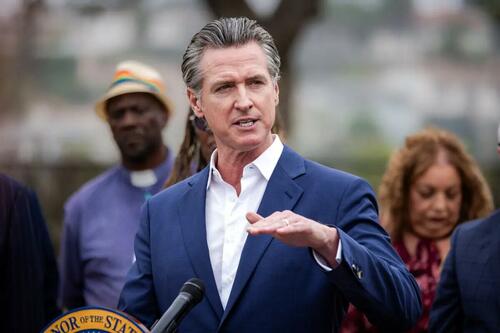 California Gov. Gavin Newsom speaks in Los Angeles on Sept. 25, 2024. John Fredricks/The Epoch Times
California Gov. Gavin Newsom speaks in Los Angeles on Sept. 25, 2024. John Fredricks/The Epoch Times
University of Southern California professor of business management Michael Mische, however, said California’s ranking has more to do with how other economies did last year.
“California’s number four position has more to do with the poorly performing ... economies of Japan and Germany than it does with any in-state specific initiatives,” Mische told The Epoch Times.
California’s economy grew by 13.3 percent from 2019 to 2024, while Japan’s economy saw only a 0.9 percent increase and Germany’s was only 0.3 percent, Mische said.
“So, Japan and Germany grew at less than 1% for the 2019 to 2024 period in real GDP terms,” he said.
Japan has suffered from a prolonged state of decline, while Germany is enduring high labor and energy costs, he added.
Marshall Toplansky, an associate professor and faculty fellow in innovation at Chapman University’s College of Business and Economics, noted that tariffs could slow California’s economy.
“The interesting question here is whether the impact of tariffs will change this,“ Toplansky told The Epoch Times. ”I think we will be feeling a slowdown in trade if the tariffs continue at high levels.”
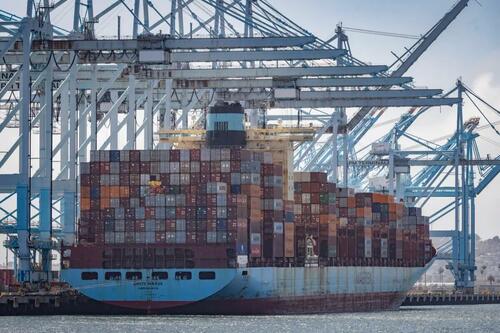 Shipping containers line the Port of Los Angeles on March 28, 2025. John Fredricks/The Epoch Times
Shipping containers line the Port of Los Angeles on March 28, 2025. John Fredricks/The Epoch Times
The issue is how high the tariffs will be and how long they will last, he added.
“The ports of Los Angeles and Long Beach will very likely see a drop in volume, and it is not clear to what extent they will hurt overall GDP for the state,” Toplansky said.
Newsom filed a lawsuit on April 16 in federal court challenging President Donald Trump’s tariffs, claiming they will hurt states, consumers, and businesses.
-
Site: LifeNews
Last week Gov. Sanders signed a measure budgeting $2 million for grant funding to charities that help women with unplanned pregnancies.
H.B. 1202 by the legislature’s Joint Budget Committee provides $2 million in funding for grants to pregnancy help organizations.
Under H.B. 1202, grant money can go to pregnancy resource centers, maternity homes, adoption agencies, and other charitable organizations that provide material support to women with unplanned pregnancies.
LifeNews is on TruthSocial. Please follow us here.
The State of Arkansas also can award funding to charities that promote infant and maternal wellness and reduce infant and maternal mortality by:
- Providing nutritional information and/or nutritional counseling;
- Providing prenatal vitamins;
- Providing a list of prenatal medical care options;
- Providing social, emotional, and/or material support; or
- Providing referrals for WIC and community-based nutritional services, including food banks, food pantries, and food distribution centers.
The measure makes it clear that grant money will not go to abortionists or their affiliates.
Since 2022 Family Council has worked with the Arkansas Legislature and the governor to secure funding every year for pregnancy resource centers. These state-funded grants have helped support dozens of charities that assist women and children in Arkansas.
The grants are optional. Pregnancy resource centers are not required to accept public tax dollars if they do not want to. But for those who do receive grant money, the funding may make a tremendous difference.
Pro-lifers in Arkansas have worked hard to prohibit abortion. We need to work to make abortion irrelevant and unthinkable as well. Supporting pregnancy resource centers is one way we can do that.
Pregnancy resource centers give women real options besides abortion — making it less likely they will travel out of state for abortion or order illegal abortion drugs online.
With the governor’s signature, H.B. 1202 is now Act 1006 of 2025.
We want to recognize the Arkansas Legislature for proposing and passing this good law, and we want to thank the governor for signing it.
Act 1006 means Arkansas will be able to continue providing real support to women and families. That is something to celebrate!
LifeNews Note: Jerry Cox is the president of the Arkansas Family Council.

The post Governor Signs Measure for $2 Million to Help Pregnant Moms After Arkansas Bans Abortions appeared first on LifeNews.com.
-
Site: Zero HedgeFutures Flat As Markets Brace For Earnings TsunamiTyler Durden Tue, 04/29/2025 - 08:29
US equity futures were unchanged, erasing a modest gain and loss earlier, after General Motors pulled earnings guidance for 2025 and put share buybacks on hold until it has more clarity on the impact of US tariffs. As of 8:15am, S&P futures were flat, while Nasdaq futures were down 0.2% as TSLA rose +1.0% pre-mkt, followed by MSFT +0.5% and AMZN +0.5%. GM dropped in premarket trading, reversing an earlier gain, as it said it would suspend $4 billion of share repurchases. Bond yields and USD are higher (2-, 5-, 10-yr yields are 1.6bp, 2.9bp, 2.7bp higher). Commodities are mixed with WTI futures dropping 1.7%, adding to sharp losses seen Monday, Base Metals higher, and Precious Metals mixed. WSJ repeated a report from last week that Trump may ease his auto tariffs today; Elsewhere, Scott Bessent set July 4 as the goal to pass Trump’s tax cut package; he will announce the debt-ceiling X-date this week or next. Today, the key macro focus will be JOLTS Job Openings and Conf. Board Consumer Confidence.
In premarket trading, Magnificent Seven stocks are mixed as futures whipsaw )Amazon +0.2%, Alphabet +0.2%, Microsoft +0.1%, Apple +0.1%, Tesla -0.1%, Meta -0.1%, Nvidia -0.7%). General Motors (GM) shares fall 2.4% premarket after the automaker withdrew 2025 earnings guidance and paused $4 billion in share repurchases until it has more clarity on tariff impacts. Hims & Hers Health Inc. (HIMS) shares soared as much as 46% as it’s among companies Novo Nordisk A/S is partnering with to offer its popular weight-loss drug Wegovy to more US patients at a reduced price. Here are some other notable premarket movers:
- Crown Holdings (CCK) shares rise 3.3% after the beverage can maker reported adjusted earnings per share for the first quarter that beat the average analyst estimate. Analysts note strong volumes in Europe and Brazil
- Honeywell International Inc. (HON) shares gain 4.7% after the company raised its full-year guidance for earnings per share.
- PayPal (PYPL) shares are down 4.1% in premarket trading after the company reported fewer payment transactions in the first quarter than analysts expected.
- Okta (OKTA) shares rise 3.8% after S&P Dow Jones Indices announced that the stock will replace Berry Global in the S&P MidCap 400 before trading opens May 1.
- Regeneron (REGN) shares fall 7.5% after the drugmaker reported profit and sales for the first quarter that fell short of expectations.
- Ultra Clean (UCTT) shares are down 10% after the semiconductor manufacturing company reported first-quarter results that missed expectations and gave an outlook that is below the analyst consensus.
- UPS (UPS) shares are up 2% after the company reported adjusted earnings per share in the first quarter above what analysts expected
- Waste Management (WM) shares fall 1.7% after the firm’s first-quarter update missed revenue expectations and free cash flow dropped, with analysts saying that investors could have been hoping for more in order to support the stock’s year-to-date rally
- Wolfspeed (WOLF) shares are up 10% as the chipmaker is set for its sixth session of straight gains to match February’s winning streak
As Bloomberg notes, after weeks of intense volatility, markets now seem to be in a holding pattern. Gold is consolidating after hitting record highs, the DXY dollar index remains below its key 100 level, and oil is drifting lower. For investors, it’s difficult to find consensus, with risk management, confidence, and the guiding narrative on US exceptionalism upended by tariffs.
“With the uncertainty created by the tariffs we need to start pricing at least a probability of a US recession,” Johanna Kyrklund, chief investment officer at Schroders Plc, told Bloomberg TV. “As we analyze each company stock-by-stock, we’re looking for that risk to growth.”
Tariff sentiment continues to drive price action, with investors weighing plans by the Trump administration to ease the impact of auto tariffs by lifting some levies on foreign parts for cars and trucks made inside the US. However, it doesn’t look like a trade resolution is coming anytime soon. China’s top diplomat warned countries against caving in to US tariff threats, and Trump’s tactics are only serving to make China’s Xi Jinping more popular. At home, Treasury Secretary Bessent set a July 4 goal to pass a multi-trillion dollar tax cut package to appease voters getting fed up of Trump’s handling of the economy.
Still, with just over a third of S&P 500 companies reporting quarterly results, of those, 75% have beat estimates, according to data compiled by Bloomberg. S&P 500-listed companies worth $20 trillion are set to deliver results this week in one of the heaviest for 2025 earnings seasons. But the next few days are key: companies worth $20 trillion are set to deliver results this week in one of the heaviest for 2025 earnings seasons.
Beyond the plethora of earnings, investors will be tracking data for clues on economic resilience in the face of tariffs. Prospects for Federal Reserve interest-rate cuts will be guided by Friday’s US non-farm payrolls figures. Sentiment earlier was boosted by signs of easing trade tensions after a White House official said imported automobiles would be given a reprieve from separate tariffs on aluminum and steel.
In Canada, the Liberal Party is projected to win a fourth consecutive election, giving a mandate to former central banker Mark Carney.
European stocks rise 0.4%, with risk sentiment improving after the US said imported autos would be given a reprieve from separate tariffs on aluminum and steel. Miners, travel and banks are the strongest-performing European sectors, while the IBEX lags peers, dropping 0.5%, as Spain deals with the fallout of a massive blackout. In earnings, Deutsche Bank shares rise after its trading unit hit a record. HSBC climbs after announcing a fresh share buyback. BP shares fall after the oil major cut its buyback as profit missed forecasts. Here are some of the biggest movers on Tuesday:
- Rheinmetall shares rise as much as 7.3% after smashing expectations across the board with analysts praising a blowout quarter.
- Deutsche Bank shares gain as much as 4.6% after the lender posted a strong set of results, led by its trading unit hitting a record in the first quarter amid high market volatility.
- Neste shares gain as much as 13% after the Finnish refiner posted an increase in margins within its renewable product unit in the first quarter results.
- HelloFresh shares jump as much as 12% after the meal-kit company reported first-quarter adjusted Ebitda that beat estimates by roughly 30%, a sign that the firm is hastening its pivot to profitability as it cuts fulfillment and marketing expenses.
- Amundi shares slide as much as 2.4% after the investment manager’s first-quarter earnings showed a mixed performance that could weigh on consensus estimates, according to analysts.
- Porsche shares fall as much as 7.6%, their steepest drop since early February, after the luxury carmaker issued another profit warning.
- Deutsche Boerse shares fall as much as 5.7% after the German stock-exchange operator reported earnings for the first quarter that missed the average analyst estimate.
- Lufthansa shares fall as much as 2.9%. Results for the first quarter are largely in line and the carrier expects strong demand during the second quarter, though analysts note that weakening demand on the North Atlantic presents warning signs ahead of the peak summer season.
- Volvo Cars shares fall as much as 11% to a record low after the Swedish automaker posted first-quarter results that missed estimates and withdrew guidance for this year and next due to uncertainty around US tariffs.
- Elekta shares drop as much as 6.2% after an unidentified holder offered up to 15m shares via Goldman Sachs at a discount of 5.5% vs. Monday’s close, according to terms seen by Bloomberg.
- Nordic Semi shares slide as much as 9.4% after the chipmaker forecast 2Q sales below consensus estimates, citing increased risks from trade tensions and tariffs.
Asian equities advanced, rising to the highest level this month, on a rally in some Chinese technology shares and a sentiment boost from further signs of the US dialing down its trade rhetoric. The MSCI Asia Pacific Index gained as much as 0.7% Tuesday. TSMC and Meituan provided the biggest boost to the gauge, while India’s Reliance Industries extended its rally triggered by better-than-expected earnings. Benchmarks advanced in Hong Kong, Taiwan, India and South Korea. Japanese markets were closed for a holiday. Asian markets have largely recovered from the hit sparked by President Donald Trump’s reciprocal tariff announcements on April 2 amid hopes for trade deals. In the latest positive sign, Trump is on track to ease the impact of his auto tariffs, with changes sought by the industry that would lift some levies on foreign parts made inside the US.
- Australia: S&P/ASX 200 +0.92%, extending its winning streak to a 4th straight session as investors brushed off global trade uncertainties. Domestically, expectations are growing that the RBA will deliver another 25-bps cut in May, amid rising economic uncertainty and escalating global trade concerns. Investors are now awaiting Australian inflation data, due Wednesday, for further insight into the RBA’s next move.
- Taiwan: TAIEX +1%, was once again the best performing market in the region as sentiment continues to improve following recent rally in the US. TSMC 2330 TT +0.6% led the way as it closed above TWD900 for the first time since the tariff selloff in the first week of April. Small/mid-caps continued to outperform, as OTC index have rallied for 6th straight days, while beaten down AI ROBOTICS/BBU plays surged today.
- Korea: KOSPI +0.65%, rebounded. led by locals’ inflow. Locals extended their net buying streak for 3 consecutive days, mainly buying Tech (+$69mn) and Financials (+$94mn) today while foreigners remained as net sellers of equities, mainly selling Transport Equipment (-$231mn, comprised heavily of Shipbuilders, Defense, and Autos). Hanwha Ocean 042660 KR -12.1% as the name plunged after Co's shareholder KDB announced to raise up to W1.1trn (c. $735mn) through a block deal. Meanwhile, Korean Autos (KRXAUTO +1.6%) gained as President Trump is expected to soften the impact of this auto tariffs.
- Japan: The market is closed today (Showa Day) and will resume trading on April 30th.
- China: SHSZ300 -0.2%, traded choppy as Sino-US trade uncertainty weighed on sentiment. China reiterated that it is not involved in trade talks with the US. Small cap and TMTs overthrown large cap but neither of them gave a strong conviction. Innovance 300124 CH +4% post earnings beat. Healthcare rebounded, but A is lagging H. Xinqi pharma 300573 +14% post earnings 3x in 1Q. There is also a peer bank report released yesterday calling for China HC re-rating, especially in the domestic pure revenue names like Ping An Good Doctor, and Ali health.
- HK: HSI +0.2%. SB turned net seller of -US$827mm today, continuing general trend of outflows from last week. On the flows front, the desk saw active managers sell into liquidity from passive buying. Wuxi AppTec 2359 HK +4.2% after 1Q25 earnings beat on both top and bottom line. Geely 175 HK also +4.2% after subsidiary Volvo indicated they would reduce costs. In contrast, BYD 1211 HK -2.6% as concerns of waning demand from yesterday persisted.
In FX, the Bloomberg Dollar Spot Index rose 0.2% after falling 0.5% on Monday, when a disappointing manufacturing activity report added to concerns over US economic growth; haven currencies the yen and Swiss franc, were the biggest underperformers versus the dollar, down 0.6% and 0.4% respectively
- CAD/USD was little-changed at 1.3831, outperforming other Group-of-10 currencies which were lower across the board
- EUR/USD fell 0.3% to 1.1388; 10-year bund yield fell 3bps to 2.49%
- GBP/USD also slipped, pulling away from a three-year high; gilts edged up, tracking gains in other European bonds
In rates, treasury futures drift lower into early US session, unwinding a portion of gains seen Monday and underperforming core European bonds. US yields cheaper by 1bp to 3bp across the curve with 2s10s steeper by 1bp on the day; US 10-year yields trade back up 3bps to around 4.24% with bunds and gilts outperforming by 4bp and 5.5bp in the sector.
In commodities, WTI drifts 1.6% lower to trade near $61.03. Spot gold falls roughly $29 to trade near $3,315/oz. Most base metals are in the green. Bitcoin climbs to around $95,000.
The US economic calendar includes March wholesale inventories, February S&P CoreLogic house prices (9am), March JOLTS job openings, April consumer confidence (10am) and April Dallas Fed services activity (10:30am). From central banks, we’ll hear from the ECB’s Cipollone and Holzmann, and the BoE’s Ramsden. The Fed's talking heads remain mute thanks to the communications blackout ahead of the May 7 FOMC meeting. Finally, earnings releases include Starbucks, Visa, Pfizer and UPS.
Market Snapshot
- S&P 500 mini +0.1%
- Nasdaq 100 mini +0.1%
- Russell 2000 mini +0.1%
- Stoxx Europe 600 +0.2%
- DAX +0.6%, CAC 40 -0.1%
- 10-year Treasury yield +2 basis points at 4.23%
- VIX -0.3 points at 24.86
- Bloomberg Dollar Index +0.2% at 1222.16
- euro -0.2% at $1.1394
- WTI crude -1.4% at $61.17/barrel
Top Overnight News
- Canada’s Liberal Party won a fourth straight election, handing Mark Carney a mandate but with a narrow margin of victory. The loonie was steady. The Liberals led with 168 seats, ahead of the Conservative Party’s 144 but short of the 172 required for a majority. The Bloc Québécois would hold the balance of power in a minority government, raising the likelihood of a looser fiscal policy than Carney wants. Carney vowed to win the trade war with the US and strengthen alliances with other countries. BBG
- President Trump is expected to soften the impact of his automotive tariffs, preventing duties on foreign-made cars from stacking on top of other tariffs he has imposed and easing some levies on foreign parts used to manufacture cars in the U.S. WSJ
- White House said Trump wants tax cuts in this reconciliation package, while it was separately reported that Bessent said he hopes the Trump tax bill can be done by July 4th.
- US Treasury Financing Estimates (Q2): expects to borrow USD 514bln in privately-held net marketable debt, assuming end of June cash balance of 850bln (prev. guided USD 123bln, assuming end of June cash balance USD 850bln).
- China’s copper stockpiles are on track to dwindle to nothing in just a few months, as the market suffers “one of the greatest tightening shocks” in its history on fears of US tariffs. FT
- China said it’s open to working with US companies after halting Boeing jet deliveries. India plans to highlight its large pipeline of Boeing orders and potential for more to secure a favorable trade deal with the US. BBG
- China said the US should stop making threats and pursue dialogue based on mutual respect. Earlier, Foreign Minister Wang Yi warned countries against caving in to tariff threats. BBG
- Eurozone inflation expectations rise, with 12-month climbing 30bp to 2.9% (highest since Apr ’24) and 36-month advancing 10bp to 2.5% (highest since Mar ’24). ECB
- Pakistan’s army said it shot down an Indian spy drone along their disputed border in the Kashmir region, as tensions rise over last week’s militant attacks. BBG
- A union representing West Coast dockworkers has sharply criticized President Trump over his “reckless” tariffs that will hurt American workers. The union noted the tariffs have created tension with allies and are a “direct attack” on the working class. The Hill
- Scott Bessent set a July 4 goal to pass Trump’s multi-trillion dollar tax cut package. He also said the debt-ceiling X date will be announced this week or next. BBG
Tariffs/Trade
- US President Trump is expected to soften the impact of his automotive tariffs by preventing duties on foreign-made cars from stacking on top of other tariffs he imposed and easing some levies on foreign parts used to manufacture cars in the US, according to WSJ citing sources. Furthermore, a White House official said those actions are expected on Tuesday and Commerce Secretary Lutnick said President Trump is building an important partnership with both the domestic automakers and American workers, while Lutnick added this deal rewards companies who manufacture domestically, as well as provides a runway to manufacturers who have expressed commitment to invest in America and expand their domestic manufacturing.
- Chinese Foreign Minister Wang Yi said concession and retreat will only make the bully more aggressive.
- China's MOFCOM said on the report that Boeing flew back three 737 MAX planes to be delivered to Chinese airlines, that China and the US have maintained long-term mutually beneficial cooperation in the field of civil aviation, while it added the US wielded the big stick of tariffs to seriously impact the stability of global industrial and supply chains, and many enterprises were unable to carry out normal trade and investment activities.
- Italian PM Meloni says times are not mature yet for an EU-US summit, according to Corriere Della Sera.
A more detailed look at global markets courtesy of Newsquawk
APAC stocks were mostly in the green but with some of the gains capped following the choppy performance stateside and in holiday-thinned conditions with Japanese markets closed for a holiday, while reports that US President Trump is expected to soften the impact of his automotive tariffs saw a muted reaction. ASX 200 gained amid outperformance in the energy, tech and resources sectors, while miners were also lifted as participants digested output updates. Hang Seng and Shanghai Comp were varied as the mainland lagged owing to uncertainty from the US-China trade war with US Treasury Secretary Bessent recently commenting that it is up to China to de-escalate and that he has an "escalation ladder in his back pocket", while China's Foreign Ministry reiterated its denial regarding a Trump-Xi call and Foreign Minister Wang Yi warned that compromise and backing down would only embolden the bully.
Top Asian News
- Japan and Malaysia are reportedly exploring broader economic ties including AI and automotive.
- Alibaba (9988 HK) introduced Qwen3 to set a new benchmark in open-source AI with hybrid reasoning.
- Earthquake of magnitude 5.0 strikes China's Tibet region, via CENC.
- Agricultural Bank (1288 HK) Q1 (CNH) Revenue 186bln (exp. 185bln), Net Income 72.1bln (exp. 73.95bln), +2.2% Y/Y, NII 140.6bln (exp. 142.7bln), CET1 11.23%.
- Industrial and Commercial Bank of China (1398 HK) Q1 (CNH) NII 156.78bln (exp. 161.29bln), Net Income 84.70bln, -4% Y/Y.
- China Construction Bank (939 HK) Q1 (CNH) NII 141.92bln, NIM 1.41%.
- Bank of China (3988 HK) Q1 (CNY) Net 54.36bln (exp. 57.4bln), NIM 1.29%, Operating Income 165bln (exp. 155bln)
European bourses opened modestly firmer/flat, but some modest pressure crept into the complex as the morning progressed – with indices generally off best levels, to show a mixed picture in Europe. European sectors hold a slight positive bias, albeit with the breadth of the market fairly narrow. Basic Resources takes the top spot, followed closely by Media and Banks. Energy is found at the foot of the pile, dragged down by post-earning losses in BP (-4%); the continued pressure in the crude complex is also not helping. Autos find themselves towards the middle of the bunch. For the sector more generally, US President Trump is expected to soften the impact of his automotive tariffs, by preventing duties on foreign-made cars from stacking on top of other tariffs he imposed and easing some levies on foreign parts used to manufacture cars in the US, via WSJ. For stock specifics, Porsche AG (-5%) dips after it cut FY25 guidance; Volvo Car (-8.3%) reported a significant miss on its EBIT and Revenue figure and launched a SEK 18bln cost and cash action plan.
Top European News
- ECB Consumer Expectations Survey: March: See inflation in next 12 months at 2.9% (prev. 2.6%); 3y ahead sees 2.5% (prev. 2.4%); 12-month is highest since April 2024. Economic growth expectations for the next 12 months were stable in March, standing at -1.2%.
- ECB's Cipollone says that ECB staff estimates suggest that the recently observed increase in financial market volatility might imply lower GDP growth of about 0.2ppts in 2025.
FX
- USD is attempting to claw back some of yesterday's losses that were in part driven by a soft outturn for Dallas Fed Manufacturing data. On the trade front, US President Trump is expected today to announce measures to soften the impact of his automotive tariffs by preventing duties on foreign-made cars from stacking on top of other tariffs, according to WSJ. DXY has risen as high as 99.31 but is yet to venture near Monday's best at 99.83.
- EUR/USD has faded some of its recent gains and failed to sustain the 1.1400 status with recent price action largely driven by moves in the greenback. Spanish CPI metrics which printed hotter-than-expected on a Y/Y, M/M and core basis. EUR/USD is currently contained within Monday's 1.1329-1.1425 range.
- USD/JPY marginally rebounded from support around the 142.00 level after sliding yesterday owing to the early initial risk aversion and lower US yield environment but with the recovery limited in the absence of Japanese participants. USD/JPY has ventured as high as 142.57 but is some way off Monday's opening level at 143.57.
- GBP is a touch softer after Monday's session of outperformance which didn't appear to be driven by any obvious catalyst. BoE's Ramsden is due later; Cable matched its YTD high printed yesterday at 1.3444 before pulling back.
- Antipodeans are both softer vs. the greenback amid a lack of pertinent newsflow out of Australia and New Zealand. That will change tomorrow for AUD with Australian Q1 CPI due on deck.
- CAD in focus after Canada's ruling Liberals, led by Mark Carney, won the national election. However, the outcome was closer than predicted by polls and will require the party to form a minority government. Accordingly, initial support for CAD has faded as markets reprice away from expectations of a majority government. USD/CAD currently sits towards the bottom end of yesterday's 1.3816-92 range.
- Canada's ruling Liberals led by Mark Carney won the national election but will need to form a minority government, according to CTV.
- PBoC set USD/CNY mid-point at 7.2029 vs exp. 7.2781 (Prev. 7.2043).
Fixed Income
- A contained start for fixed income given the Japanese holiday (Showa Day) overnight, meaning that there was no cash trade. USTs currently at the lower-end of a very thin 111-22 to 111-30 band and one that is within Monday’s 111-10 to 111-31 confines. Focus ahead is on, US Consumer Confidence, Advance Goods Trade and JOLTS Job Openings.
- Bunds is modestly firmer. On the data front, Spain’s inflation printed hotter-than-expected across the board and sent Bunds to a 131.16 low with Alphabet’s presence in the market perhaps also weighing. Thereafter, Bunds have recovered a touch and are back into the green and just off a 131.46 session high; a high that printed as the European risk tone came under a little bit of pressure after the Russian Kremlin said Ukraine has not responded to its latest ceasefire proposal.
- Gilts are flat given the lack of leads from sparse overnight trade and a European morning that has been devoid of UK-specifics aside from earnings. At the lower end of a 92.96 to 93.25 band, comfortably within Monday’s 92.79 to 93.33 range. BoE's Ramsden is due later.
- UK sells GBP 900mln 1.25% 2054 I/L Gilt: b/c 3.31x (prev. 3.06x) & real yield 2.175% (prev. 2.126%).
- Italy sells EUR 7.5bln vs exp. EUR 6.5-7.5bln 2.95% 2030, 3.60% 2035 BTP & EUR vs exp. EUR 1.5-2.0bln 2033 CCTeu.
- Alphabet (GOOGL) kicks of debut sale of EUR debt 4yr IPTs mid-swaps +85bps area. 8yr IPTs mid-swaps +105bps area. 12yr IPTs mid-swaps +125bps area.
Commodities
- Crude is on the backfoot, extending on the prior day's losses; there has been little by way of fresh oil-specific newsflow, so focus has been on updates out of Russia/Ukraine; most recently, Russia's Kremlin suggested Ukraine had not responded to offers to commence negotiations. Brent July'25 currently trades in a USD 63.62-64.81/bbl range.
- TTF is lower on the day, after finishing Monday’s session modestly higher, surrounding a number of updates including the blackout in Spain and a three-day ceasefire proposal from Russia. With Spain and Portugal’s blackout almost fully resolved today’s attention now shifts to Russia's ceasefire proposal, announced for May 8th-11th. As it stands, Russia says Ukraine is not responding to the proposal.
- Spot gold continues its reversal from recent record highs, with a number of risk events ahead including US consumer confidence and pivotal speakers such as Commerce Secretary Lutnick and Treasury Secretary Bessent who are likely to speak on auto tariffs. Thus far, today’s low has been recorded at USD 3,314/oz, with a high of USD 3,359/oz.
- Copper is a little firmer after a broad base metals bid this morning, lifting it from near session lows of USD 9,368/t, to session highs of USD 9,455/t, currently holding just off best levels.
- Spain's PM said the government will release 3 days worth of strategic oil reserves, while the grid operator later restored nearly all power.
- China's copper supplies are on track to be depleted in just a few months as the market suffers one of the greatest tightening shocks due to fears of US tariffs, according to commodities trading house Mercuria cited by FT.
- Kazakhstan Q1 oil exports +7% Y/Y to 1.63mln BPD, according to Reuters calculations and official data.
Geopolitics: Middle East
- US President Trump intends to extend the two-month deadline allocated for US-Iran negotiations, according to Israel Hayom citing Israeli officials
- Gaza talks in Cairo are said to be witnessing a "significant breakthrough" and parties agreed on a number of issues including consensus on a long-term ceasefire in Gaza, although some sticking points remain including Hamas arms, according to Reuters citing two Egyptian sources.
Geopolitics: Ukraine
- Explosions were heard in Kyiv after the Ukraine air force issued air raid alerts and air defence systems were engaged in repelling a Russian air attack.
- Russian Kremlin says Ukraine has not responded to many offers by President Putin to commence negotiations without any preconditions, according to Tass Direct talks with Ukraine need to commence, adding this is primary and the legitimacy of Zelensky is secondary. 30-day ceasefire is impossible without settling all the nuances.
US Event Calendar
- 8:30 am: Mar P Wholesale Inventories MoM, est. 0.6%, prior 0.3%
- 9:00 am: Feb FHFA House Price Index MoM, est. 0.3%, prior 0.2%
- 9:00 am: Feb S&P CoreLogic CS 20-City YoY NSA, est. 4.7%, prior 4.67%
- 10:00 am: Mar JOLTS Job Openings, est. 7500k, prior 7568k
- 10:00 am: Apr Conf. Board Consumer Confidence, est. 88, prior 92.9
DB's Jim Reid concludes the overnight wrap
It's shorts and sandals weather here in the UK which is lovely unless it forces you to look at the horrible brusing of my broken little toe. Enjoy the sunshine if you're in Europe this week.
After last week’s rally, markets saw a choppy start to a busy week with the S&P 500 recovering from a -1% decline to narrowly post a fifth consecutive gain (+0.06%) last night, even as the Mag-7 (-0.36%) lagged ahead of Meta and Microsoft earnings tomorrow and Apple and Amazon on Thursday. 10yr Treasuries (-2.7bps) also gained for a fifth session in a row, falling to their lowest level in three weeks at 4.21%.
On tariffs, the latest newsflow was actually fairly positive at face value, as US officials continued to sound optimistic about potential trade deals yesterday. For instance, Treasury Secretary Bessent said that they’d had “many countries come forward and present some very good proposals”. He also said “I would guess that India would be one of the first trade deals we would sign”. Separately, White House Press Secretary Karoline Leavitt also said that more details on trade talks would be announced this week. And later on, Bessent tweeted that they were “continuing to make substantive movement on negotiations with many of our trading partners.” So the rhetoric from the administration is still pointing towards negotiations, rather than further escalation. However, there was still little sign of dialogue between the US and China, with Bessent saying “I believe it’s up to China to de-escalate”. Overnight the incremental positive news has continued with the White House confirming an earlier WSJ story that imported autos would not also face additional aluminum and steel tariffs. This has helped lift S&P (+0.19%) and Nasdaq (+0.24%) futures this morning.
This steady flow of mostly more positive trade headlines lifted the S&P 500 from as low as -1.02% mid-way through yesterday's session to ultimately close marginally higher on the day (+0.06%). That left the index still narrowly in technical correction territory, closing -10.02% below its peak in mid-February, but its slightly above that mark again this morning. It was actually a decent day in terms of market breadth, with two-thirds of the S&P 500 constituents moving higher on the day and its equal-weighted version up +0.30%. By contrast, tech stock underperformance saw the Magnificent 7 decline by -0.36%, led by a -2.05% fall for Nvidia as the chipmaker struggled following news that China’s Huawei is set to test a new chip that could end up being a competitor.
Earlier in yesterday’s session, the mood at the lows wasn’t helped by the Dallas Fed’s manufacturing survey, which plunged to its lowest level since May 2020. Specifically, the general business activity index was down to -35.8, and the raw materials prices index also moved up to its highest level since mid-2022, at 48.4. So that added to the stagflationary narrative, although it’s worth noting that this is a survey once again rather than hard data, and so far the surveys have tended to suggest a worse performance relative to the hard data. As a result, markets weren’t too reactive to the print directly, but it added to the more downbeat backdrop going into this week’s other releases.
US Treasuries saw a more consistent performance, with 10yr yields falling -2.7bps to 4.21% and 2yr yields down -5.4bps to 3.70%, their lowest level since April 4th. Yesterday afternoon, the Treasury released its latest quarterly borrowing estimates, with the Q2 issuance estimate revised up to $514bn from $123bn due to a lower starting cash balance and with the Q3 estimate at $554bn. These figures were slightly above our rate strategists expectations but this may be due to the Treasury not yet factoring in increased tariff revenues. The announcement had limited impact on yields, which closed near the session’s lows. In other fiscal news, after the US close Treasury Secretary Bessent said the administration hoped to have Congress pass their tax bill by July 4.
With rates moving lower, one US asset that did lose ground yesterday was the dollar, with the dollar index down -0.54%, as the safe haven currencies of the Swiss franc (+1.02%) and Japanese yen (+1.17%) outperformed.
Back in Europe, there was a stronger risk-on tone, which reinstated the pattern of European outperformance in 2025. In fact, at the intraday peak, the DAX (+0.13% at the close) even managed to entirely erase its losses since Liberation Day, although by the end of the session it was still -0.53% beneath its levels on April 2. Nevertheless, the index was still up for the 8th time in the last 9 sessions, and those gains were echoed across the continent. For instance, the STOXX 600 (+0.53%) advanced for a 5th consecutive day, as did France’s CAC 40 (+0.50%). The smallest yet most notable rise was the FTSE 100 (+0.02%), which posted an 11th consecutive advance for the first time since 2019, and if it manages a 12th consecutive gain today, that would be the first time since 2017.
Consistent with that risk-on tone, European sovereign bond yields also moved higher, with those on 10yr bunds (+5.1bps), OATs (+4.9bps) and BTPs (+5.5bps) all rising. Likewise, credit spreads tightened further, with Euro HY spreads down -4bps to 349bps, edging closer to their Liberation Day level of 322bps.
In political news, Prime Minister Mark Carney's Liberal Party is projected to win the Canadian federal election. However, with projections showing the Liberals leading in only 155 of 343 seats – shy of the 172 needed for a majority – Carney is likely facing a minority government and will need to negotiate with other parties to pass legislation. The Conservatives are currently projected to win 150 seats. So a remarkable comeback for the Liberals relative to their January lows when they were over 25pp down in the polls but seemingly not quite as good as they would have hoped as the polls closed last night.
In Asia the fresh overnight news on auto tariffs we discussed at the top seems to be helping push markets higher. The S&P/ASX 200 (+0.91%) has hit a near 2-month high with the KOSPI (+0.65%) and the Hang Seng (+0.38%) also edging higher while Chinese equities are bucking the positive trend with the CSI (-0.14%) and the Shanghai Composite (-0.05%) seeing minor losses. Elsewhere, Japanese markets are closed for a public holiday. There’s no trading of cash Treasuries in Asia as Japan is closed.
To the day ahead now, and data releases from the US include the JOLTS report for March, the Conference Board’s consumer confidence indicator for April, and the FHFA’s house price index for February. Meanwhile in the Euro Area, we’ll get the M3 money supply for March, and the European Commission’s economic sentiment indicator for April. From central banks, we’ll hear from the ECB’s Cipollone and Holzmann, and the BoE’s Ramsden. Finally, earnings releases include Starbucks, Visa, Pfizer and UPS.
-
Site: Mises InstituteBut Bessent says tariffs won't cause any supply chain shocks (for some reason.)
-
Site: Novus Motus LiturgicusRecommended Art History and Artistic Practice Text Books for Homeschoolers... and Everyone Else Too!I want to recommend the Catholic Heritage Currricula texts books to all who are looking for materials for courses in art history, art theory and artistic practice at the middle-school or high-school level. These books present a curriculum that combines art history, art theory, and a theory of culture in a Catholic way. Furthermore, they provide the basis for artistic practice, offering simple David Claytonhttp://www.blogger.com/profile/07041908477492455609noreply@blogger.com0
-
Site: AsiaNews.itThe latest to lose their lives were two students from Comilla while flying kites. Lightning is one of the leading causes of death in the country, with 3,845 deaths since 2011. Despite the development of early warning systems, deaths are mainly among farmers. The government is pushing for timely alerts via text message and phone calls, but obstacles remain in rural areas. Tree planting and awareness-raising are crucial preventive measures.


